英语基本文学词汇表
英语专业英美文学文学词汇大全Literature terms
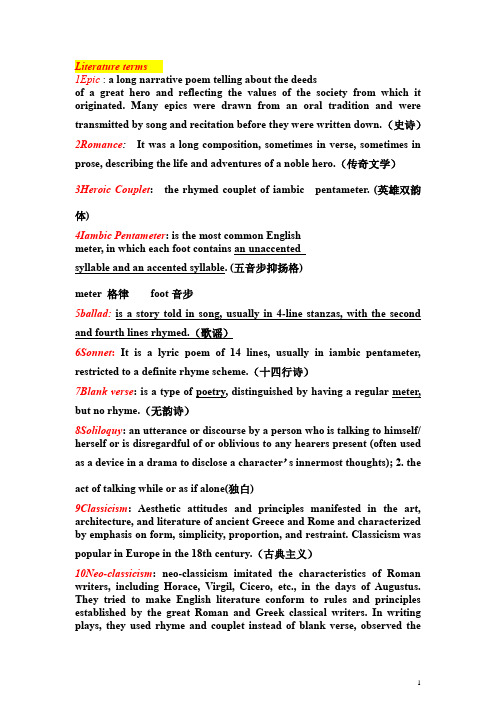
Literature terms1Epic : a long narrative poem telling about the deedsof a great hero and reflecting the values of the society from which it originated. Many epics were drawn from an oral tradition and were transmitted by song and recitation before they were written down.(史诗)2Romance:It was a long composition, sometimes in verse, sometimes in prose, describing the life and adventures of a noble hero.(传奇文学)3Heroic Couplet: the rhymed couplet of iambic pentameter. (英雄双韵体)4Iambic Pentameter: is the most common Englishmeter, in which each foot contains an unaccentedsyllable and an accented syllable. (五音步抑扬格)meter 格律foot音步5ballad:is a story told in song, usually in 4-line stanzas, with the second and fourth lines rhymed.(歌谣)6Sonnet: It is a lyric poem of 14 lines, usually in iambic pentameter, restricted to a definite rhyme scheme.(十四行诗)7Blank verse: is a type of poetry, distinguished by having a regular meter, but no rhyme.(无韵诗)8Soliloquy: an utterance or discourse by a person who is talking to himself/ herself or is disregardful of or oblivious to any hearers present (often used as a device in a drama to disclose a character’s innermost thoughts); 2. theact of talking while or as if alone(独白)9Classicism: Aesthetic attitudes and principles manifested in the art, architecture, and literature of ancient Greece and Rome and characterized by emphasis on form, simplicity, proportion, and restraint. Classicism was popular in Europe in the 18th century.(古典主义)10Neo-classicism: neo-classicism imitated the characteristics of Roman writers, including Horace, Virgil, Cicero, etc., in the days of Augustus. They tried to make English literature conform to rules and principles established by the great Roman and Greek classical writers. In writing plays, they used rhyme and couplet instead of blank verse, observed thetrinity --- the unity of time, place and action.(新古典主义)11An epistolary novel is a novel written as a series of documents. The usual form is letters, although diary entries, newspaper clippings and otherdocuments are sometimes used.(书信体小说)12Sentimentalism is one of the important trends in English literature of the middle and later decades of the 18th century. It justly criticized the cruelty of the capitalist relations and the gross social injustices brought about by the bourgeoisrevolutions. It embraces a pessimistic outlook and blames reason and the Industrial Revolution, marked by a sincere sympathy for thepoverty-stricken ,expropriated peasants.(感伤主义)Romanticism: Romanticism is a literary trend. It prevails in England during the period 1798-1832. romanticists expressed the ideology and sentiment of those classes and social strata who were discontent with and opposed to the development of capitalism. They split into two groupsbecause of the different attitudes toward the capitalist society.(浪漫主义)Ode is a lyric poem of some length that honors an individual, a thing, a trait dealing with a lofty theme in a dignified manner. The form dates back to classical times and is originally intended to be sung at festivals or in plays.Brief Outline of British Literature:works1. Early and Medieval English Literature1) The Anglo-Saxon Period (449-1066)National epic:The Song of Beowulf2) The Anglo-Norman Period (1066-1350)Arthurian Romance: Sir Gawain andGreen Knight3) Geoffrey Chaucer1340-1400:Messenger of HumanismThe first important realistic writer“Father” of English poetryThe Canterbury Tales the wife of Bath(巴斯夫人),the Knight(骑士),the Pardoner(卖赎罪卷者),the Nun’s Priest(尼姑的教士),the Prologue(序诗).The Romaunt of the Rose 《玫瑰传奇》The Book of the Duchess 《悼公爵夫人》Troilus and Criseyde《特罗伊洛斯和克瑞西德》Thomas MaloryMorte d’Arthur (Death of Arthur)《亚瑟之死》William LanglandPiers the Plowman[Boccaccio薄伽丘:Decameron《十日谈》Ovid奥维德:《爱的艺术》《变形记》]2. The English Renaissance (16 century)Thomas MoreUtopiaChristopher Marlowe克里斯托弗·马洛First person used blank verseDeath of Arthur 《亚瑟之死》Tamburlaine the Great «帖木儿大帝»The Jew of Malta «马尔他岛的犹太人»The Tragical History of Doctor Faustus«浮士德博士的悲剧»Hero and Leander《海洛和利安得》The Passionate Shepherd to His Love《牧羊人的恋歌》William Shakespeareone of the founders of realism in world literature as well as in English literatureV enus and Adonis《维纳斯与安东尼斯》The Rape of Lucrece《鲁克里斯受辱记》Four tragedies:Hamlet《哈姆雷特》Othello《奥塞罗》King Lear《李尔王》Macbeth《麦克白》Four comedies:A Midsummer Night’s Dream《仲夏夜之梦》The Merchant of V enice《威尼斯商人》As You Like It《皆大欢喜》Twelfth Night《第十二夜》Ben Jonson本·琼森first poet- laureateafter Shakespeare the most eminent writer for the Elizabethan stagethe greatest dramatist after Shakespearethe founder of the so-called “Comedy of Humors”,Every Man in His Humor《人人高兴》Every Man Out of His Humor《人人扫兴》Volpone 《福尔蓬奈》the Fox《狐狸》The Alchemist《炼金术士》Sir Thomas Wyatt托马斯·怀亚特Henry Howard, Earl of Surrey 亨利·霍华德·萨里伯爵Sir Philip Sidney 西德尼Astrophel and Stella《爱星者和星星》Arcadia《阿卡狄亚》The Defence of Poetry《诗辩》Edmund Spenser埃德蒙·斯宾塞the Poet’s poet , a model of poetical artgreatest non-dramatic poet of his timefirst master of English verseThe Shepherd’s Calendar《牧人月历》Amoretti 《爱情小诗》The Fairy Queen《仙后》Francis Bacon 弗朗西斯·培根The father of experimental philosophyThe most important prose writer of the Elizabethan Agethe first English essayistthe founder of English materialist philosophy.The Advancement of Learning《学术的进展》The Novum Organum (The New Instrument)《新工具》The New Atlantis《新大西岛》The Essays 《散文集》(Of Studies)3. The Period of The English Bourgeois Revolution (17 century)John Milton约翰·弥尔顿the smartest man in Europea master of the blank verseParadise Lost《失乐园》Paradise Regained《复乐园》Samson Agonistes《力士参孙》Lycidas 《利西达斯》Comus《科玛斯》a masque《假面剧》John Bunyan约翰·班扬Pilgrim’s Progress《天路历程》Grace Abounding to the Chief of Sinner 《功德无量》The Life and Death of Mr. Badman《恶人先生的生平和死亡》《贝德曼先生的一生》The Holy War《神圣战争》John Donne约翰·邓恩Founder of Metaphysical poetry选学派诗人Songs and Sonnets《歌与短歌》Holy sonnet《圣十四行诗》Divine poem《神圣诗歌》Elegies and Satire《挽歌与讽刺诗》Meditations《冥想》/《沉思》4. The Age of Enlightenment (18 century)Alexander Pope亚历山大·蒲柏Essay on Criticism《论批评》The Rape of the Lock《夺发记》Joseph Addison约瑟夫·艾狄生andRichard Steel理查德·斯蒂尔The Tatler and The SpectatorDaniel Defoe丹尼尔·笛福18世纪启蒙时期现实主义小说的奠基人Robinson CrusoeCaptain Singleton《辛格顿船长》Colonel Jacque《杰克上校》Moll Flanders《茉尔·弗兰德丝》A Journal of the Plague Year《瘟疫记事》Jonathan Swift乔纳森·斯威夫特One of the greatest masters of English prosea master satiristGulliver’s TravelsA Tale of a Tub 《一个木桶的故事》The Battle of Books《书的战争》The Drapier’s Letters《一个麻布商的书信》A Modest Proposal《一个小小的建议》Samuel Richardson 塞谬尔·理查逊Pamela 《帕美勒》Clarissa: Or the History of a Young Lady《克拉丽莎》The History of Sir Charles Grandison《查尔斯·葛兰底森爵士传》Henry Fielding亨利·菲尔丁最早的现实主义小说理论家现实主义小说奠基人Tom Jones《汤姆˙琼斯》Don Quixote in England《唐吉诃德在英国》Pasqin《巴斯昆》The Historical Register for the Year 1736《一七三六年历史记事》The Tragedy of Tragedies or The Life and Death of Tom Thumb the Great 《悲剧的悲剧:或伟人汤姆传》Joseph Andrews《约瑟夫˙安德鲁斯的经历》Jonathan Wild the Great《大伟人乔纳森˙魏尔德》Amelia《阿米丽亚》Samuel Johnson塞缪尔·约翰逊As Lexicographer or The Dictionary of the English Language英语词典Oliver Goldsmith戈德史密斯Ano velist and poet belongs to the school of Sentimentalism She Stoops to Conquer《屈伸求爱》The Vicar of Wakefield 《威克菲尔德牧师传》The Traveler and The Deserted VillageThe Citizen of the World《世界公民》Richard Brinsley Sheridan 谢里丹The School for Scandal 《造谣学校》Comedy of Manners风尚喜剧Thomas Gray 格雷-------- sentimentalismOn the Death of a Favorite Cat 《爱猫之死》Elegy Written in a Country Churchyard 《墓园挽歌》The Progress of Poetry 《诗的发展》The Correspondence of Thomas Gray《格雷书信集》William Blake威廉布莱克Tiger 《老虎》Songs of Innocence《天真之歌》Songs of Experience《经验之歌》The Marriage of Heaven and Hell《天堂与地狱的婚姻》Robert Burns-罗伯特彭斯--- pre-romanticismthe most famous poets of the peasants in the worldA red red rose《我的爱人像朵红红的玫瑰》5. Romanticism in England (19 century)PoetryWilliam Wordsworth华兹华斯The prelude《序曲》Lyrical Ballads《抒情歌谣集》I Wandered Lonely as a Cloud《我好似一朵流云独自漫步》To the 《咏水仙》S. T. Coleridge柯林律治The Rime of the Ancient Mariner《古舟子咏》《古水手谣》Kubla khan 《忽必烈汗》George Gordon Byron乔治戈登拜伦One of the most excellent representatives of English Romanticismone of the most influential poets of the timeHours of Idleness《闲暇时刻》Child Harold’s Pilgrimage《恰尔德·哈罗德游记》.Don Juan《唐璜》She Walks in BeautyPercy Bysshe Shelley雪莱Prometheus Unbound《解放了的普罗米修斯》Queen Mab 《仙后麦布》Address to the Irish People《告爱尔兰人书》The Revolt of Islam《伊斯兰的反叛》The Masque of Anarchy《暴政的行列》The Cenci《钦契一家》A Defence of Poetry《诗辩》The Necessity of Atheism《无神论的必要性》Ode to the West Wind10. To a Skylark《致云雀》John Keats济慈Lamia《莱米亚》Endymion《恩底弥翁》On First Looking into Chapman’s Homer《初读查普曼译荷马史诗》Isaabella 《伊莎贝拉》The Eve of St. Agnes《圣·爱格尼斯节前夕》Hyperion《赫坡里昂》On a Grecian Urn 《希腊古瓮颂》To Autumn《秋颂》On Melancholy《忧郁颂》To a Nightingale 《夜莺颂》Prose fictionWalter Scott司各特the first novelist to recreate the pastWaverleyOld MoralityRob RoyThe Heart of MidlothianIvanhoe《艾凡赫》Rob RoyNovelJane Austen 简·奥斯丁Northanger Abbey《诺桑觉寺》Sense and Sensibility《理智与情感》Pride and Prejudice《傲慢与偏见》Mansfield Park《曼斯菲尔德花园》Emma《爱玛》Persuasion 《劝告》Romantic essayCharles Lamb查尔斯·兰姆Tales from Shakespeare《莎士比亚戏剧故事集》Album VersesEssays of Elia《伊利亚随笔》William Hazlitt威廉·赫列特Thomas De Quincey托马斯·德·昆西6. The Victorian Age --- Critical Realism in England (19 century)NovelCharles Dickens查尔斯·狄更斯Oliver Twist《雾都孤儿》The Old Curiocity Shop《老古玩店》The Pickwick Papers《匹克威克外传》fill in the BlanksBeowulf is a folk legend brought to England by the Anglo-Saxons from their primitive Northern Europe.Beowulf was passed down from mouth to mouth.Beowulf was written down in the 10th century.Humanism refers to the literary culture in the Renaissance.Humanism became the central theme of English Renaissance. Thomas More and William Shakespeare are the best representatives of the English humanistsHumanism is the idea that man has a potential for culture which distinguishes him from lower orders of beings, and which he should strive constantly to fulfill.The Renaissance is actually a movement stimulated by a series of historical events, such as the rediscovery of ancient Roman and Greek culture, the new discoveries in geography and astrology, the religious reformation and the economic expansion.Early Plays in Middle Ages include The Miracle Play奇迹剧The Morality Play道德剧The Interlud幕间休息剧The Classical Drama古典剧The immediate predecessors of Shakespeare were a group of men from the two universities of Oxford and Cambridge, who were generally known as the University WitsThe key-note of Hamlet’s character is melancholy,and there can be no Hamlet without melancholyHamlet is a hero of the RenaissanceHamlet’s learning , wisdom, noble nature,limitation and tragedy are all representative of the humanists at the turn of the 17th and the 16th centuries.Shakespeare was skilled in many poetic forms: the song, the sonnet, the couplet, and the dramatic blank verse;He was a great master of English language;He was the summit of the English Renaissance and one of the great writers all over the world.Adam and Eve embody Milton’s belief in the powers of man, craving (longing) for knowledge.Satan is a rebel against tyranny and Satan and his followers resemble a republican ParliamentEnglish enlighteners believed in the power of reason. That is why the 18th century has often been called “the age of rea son” or “the kingdom of reason”.Most of the enlighteners believed that social problems could be solved by human intelligence.this period was characterized by the so-called neo-classicism of which theleading figure was Alexander Pope.The representative of Periodical Literature in Early 18th Century England: Addison and SteeleThe best part of Robinson Crusoe is the realistic account of the successful struggle of Robinson alone against the pitiless forces of nature on the island.A social fable consists of four books. The hero of the novel is Lemuel Gulliver, a doctor. telling about his fantastic visits to some unbelievable places, in which the inhabitants are Lilliputians,the giants Brobdingnagians, Yahoos, and Houyhnhnms.The features of the Romantic writings a dissatisfaction with the bourgeois society.Romantic writings are filled with strong-willed heroes or even titanic images, formidable events and tragic situations, powerful conflicting passions and exotic picturesThe romanticists paid great attention to the spiritual and emotional life of manPersonified nature plays an important role in the pages of Romantic writingsThe publication of the “Lyrical Ballads” marked the break with the conventional poetical tradition of the 18th centuryi wandered lonely contains four six-lined stanzas of iambic tetrameter.The poem is about The beauty of natureQuestion1What is Literature?Literature refers to the practice and profession of writing. It comes from human interest in telling a story, in arranging words in artistic forms, in describing in words some aspects of human experiences.2What is Renaissance?1. DefinitionThe Renaissance (14th – mid-17th century), which means rebirth and revival. The renaissance, therefore, in essence, is a historical period in which the European humanist thinkers and scholars tried to get rid of those old feudalist ideas in medieval Europe, to introduce new ideas that expressed the interests rising bourgeoisie, and to recover the purity of the early church from the corruption of the Roman Catholic Church(罗马天主教堂).It is characterized with the growth of a more scientific outlook, major development in art and literature, new invention and overseas discoveries and a general assertion of human value and emancipation(解放) of the human intellect and power.3Summarize the periods of Shakespeare’s literary career and achievements?Shakespeare’s Literary Career⏹Four successive periods with increasing maturity◆1588-1593, the Period of Experiment and Preparation●Richard III, a melodramatic chronicle-history play, largely imitative of Marlowe and yet showing striking power●At the end of this period Shakespeare issued two rather long narrative poems on classical subjects, Venus and Adonis and The Rape of Lucrece◆1594-1601, the second period Shakespeare’s work, filled with chronicle-history plays and comedies●Richard II, Henry IV, Henry V, etc.●Midsummer Night’s Dream, The Merchant of Venice, Much Ado about Nothing, As You Like It●Romeo and Juliet◆1601-1609, the third period of Shakespeare’s literary career, in which appeared Shakespeare’s great tragedies and certain cynical plays●In these plays, Shakespeare sets himself to grapple with the deepest and darkest problems of human characters and life●Shakespeare’s four great tragedies⏹Hamlet: the struggle of a perplexed and divided soul/self⏹Othello: the ruin of a noble life/ man by an evil one through the terrible power of jealousy⏹King Lear: unnatural ingratitude working its hateful will and yetthwarted at the end by its own excess and by faithful love⏹Macbeth: the destruction of a large nature by material ambition◆After 1609, the fourth period of Shakespeare’s literary career, a periodof romance-comedies●Shakespeare did not solve the insoluble problems of life, but having presented them as powerfully, perhaps, as is possible for human intelligence, he turned in his last period to the expression of the serene philosophy of life●Cymbeline, The Winter’s Tale, and The Tempest(1) Shakespeare is one of the founders of realism in world literature. He maintains that the purpose of dramatic performance is "to hold, as it were, the mirror up to nature". In his works, he paints the decline of the old feudal nobility and the vice of the new Tudor monarch. Besides,his plays have good plots and life-like characters too. His drama is an expression, a monument of the English Renaissance since he wrote about his own people for his own time.(2)Shakespeare is amazingly prolific Within 22 years, he produced 37 plays, 154 sonnets,and 2 long poems. No two of his play invoke the same feeling or image among the audience. He is a master-hand for every form of drama-comedy, tragedy, and historical plays. He gives us a world of full-blooded people who live and struggle, suffer and rejoice-representing all the complexitiesand implications of real life.(3)Shakespeare was skilled in many poetic forms: the song, the sonnet, the couplet, andthe dramatic blank verse. And he is a great master of the English language. He used a vocabulary larger than any other English writersMany of his new c oinage and turns of expressions havebecome every-day usage in English life. Shakespeare and the Authorized Version of the EnglishBible are the two great treasures of the English language.(4)Hence, Shakespeare has been universallyacknowledged to be the summit of theEnglish Renaissance, and one of the greatest writers the world over. 3Chaucer’s Contribution?1. He introduced from Italy and France the rhymed stanza of various types, especially the rhymed couplet of 5 accents in iambic meter (heroic couplet) to English poetry, instead of the old Anglo-Saxon alliterative verse.2. He was the first great poet who wrote in English language (Middle English), thus establishing English as the literary language.3. He did much in making the London dialect the foundation for modern English language4What is the Enlightenment Movement?The 18th century marked the beginning of an intellectual movement in Europe, known as the Enlightenment, which was, on the whole, an expression of struggle of the bourgeoisie against feudalism. The enlighteners fought against class inequality, stagnation, prejudices and other survivals of feudalism.What is romanticism? What about its feature?1. The general feature is a dissatisfaction with the bourgeois society.2. Their writings are filled with strong-willed heroes or even titanic images, formidable events and tragic situations, powerful conflicting passions and exotic pictures.3. The romanticists paid great attention to the spiritual and emotional life of man.Personified nature plays an important role in the pages of their works.文学赏析Beowulf:---national epic(1) Goodness conquers evil. (Beowulf stands for all that is good, brave and proper, while the monsters stand for evil.)(2) Men against nature (The poem presents a vivid picture of how the primitive people wage heroic struggles against the hostile forces of the natural world under a wise and mighty leader.)(3) Judge the greatness of a human being by the greatness of his deeds and his noble ancestry.(4) Help thy neighbor. (Beowulf risks his life to help a neighbor, King Hrothgar, in trouble.)(5) Forces of darkness—irrational, menacing—are always at work in society.The writing features of Beowulf1). The most important is in alliterative(头韵的) verse and in artistic form.2). Another is the frequent use of metaphors and understatements(暗含的意义) for ironical humor.The Faerie(Fairy) Queene and Commentsa long poem1 The dominating thoughts of it: nationalism, humanism and Puritanism2 The Spenserian stanza: a verse form consisting of 8 iambic pentameter lines followed by a ninth line of 6 iambic feet with the rhyme scheme ababbcbcc.3 The Faerie Queene is the first national epic of England in the age of the Renaissance. It expresses the poet’s patriotic feelings of national greatness, and voices the moral ideals of the English aristocracy as embodied in the noble, virtuous and brave knight.The Image of Hamlet1. He is a humanist free from medieval prejudice and superstition. He has love for the world rather than heaven, he cherishes a firm belief inman’s power and destiny.2. He loves good and hates evil. He adore his father, loves Ophelia and greets his school-fellows with hearty welcome, while he is disgusted with his uncle’s drunkenness and shocked by his mother’s shallowness3. His intellectual genius is outstanding. He is a close observer. He can easily see through people. His quick perception drives him to penetrate below the surface of things and question what others take for granted. He is scholar, soldier and statesman. His image reflects the versatility of the men of the Renaissance.The Merchant of VeniceThe traditional themeTo praise the friendship between Antonio and Bassanio, to idealize Portia as a heroine of great beauty, wit and loyalty, and to expose the insatiable greed and brutality of the Jew.The modern interpretationTo regard the play as a satire of the Christians’hypocrisy and their false standards of friendship and love, their cunning ways of pursuing worldliness and their unreasoning prejudice against Jews, here represented by ShylockParadise lost1. The theme of the poem is a revolt against God’s authority.2. God: selfish despot暴君,cruel, unjust3. Adam and Eve embody Milton’s belief in the powers of man, craving (longing) for knowledge4. God’s angels are foolish, resembling the court of an absolute monarch.5. Satan is a rebel against tyranny(专制,暴行) and Satan and his followers resemble a republican ParliamentThe Image of Satan1. Satan is the real hero of the poem.2. He is firmer than the rest of the angels.3. He has an invincible(战无不胜的) heart.4. Satan remains superior in nobility and welcomes his defeat and his torments as a glory, a liberty and a joy;5. Satan is the spirit questioning the authority of God.6. Milton makes Satan as his own mouthpiece(代言人).The Pilgrim’s ProgressB unyan’s language1.Bunyan’s language is chiefly plain and colloquial and quite modern in comparison with that of the writers of the Renaissance.2. His language is clear, vivid, natural, homely (朴实的), fluent, musical and powerful.3. He paved the way not only in language style but also in writing technique of novels, for the novelists of the 18th century as Swift and Defoe.The image of Robinson Crusoe1.One of the representative of the rising bourgeoisie2. An enterprising Englishman3. A laborer, a hard-working industrious and intelligent man.4. A typical colonizer, explorer, and a foreign trader.5.He is alert, vigorous and resourcefulBlake’s poems such as tiger 《老虎》and comments on Blank(1) Blake’s poems seem easy but difficult to understand for his m mysterious images and symbols, unless versed in ( skilled at )religious knowledge.(2) Blake’s poems are full of emotion and apparent presentation of his progressive democratic idea in symbolismComments1) Blake was opposed to the classicism of the 18th century.2) His poems were full of romantic spirit, imagery symbolism and revolutionary spirit.3) He was a Pre-Romanticist or forerunner of the romantic poetry of the 19th century.Comments on Burns & His Poems1. Burns was one of the most famous poetsof the peasants in the world.2. He obtained the characteristic of all old Scottish songs: simplicity, vividness, humor, directness and optimism, with anew spirit of romanticism.Explanation William Wordsworth poem i wandered lonely【赏析】:这首诗写于诗人从法国回来不久。
故事文学英语词汇大全学习文学作品中常见的英语词汇和表达方式
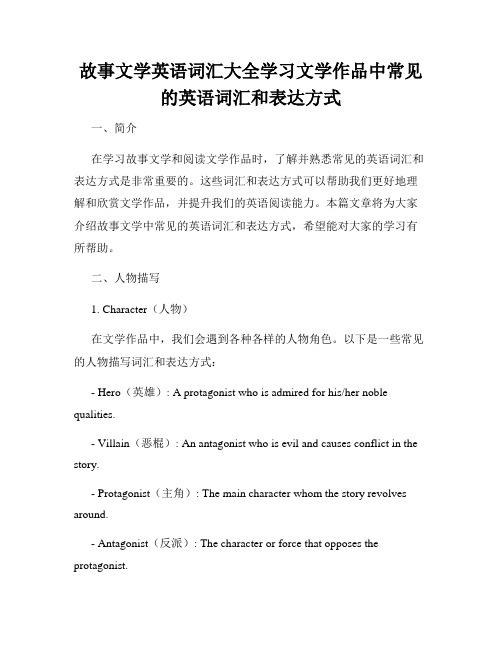
故事文学英语词汇大全学习文学作品中常见的英语词汇和表达方式一、简介在学习故事文学和阅读文学作品时,了解并熟悉常见的英语词汇和表达方式是非常重要的。
这些词汇和表达方式可以帮助我们更好地理解和欣赏文学作品,并提升我们的英语阅读能力。
本篇文章将为大家介绍故事文学中常见的英语词汇和表达方式,希望能对大家的学习有所帮助。
二、人物描写1. Character(人物)在文学作品中,我们会遇到各种各样的人物角色。
以下是一些常见的人物描写词汇和表达方式:- Hero(英雄): A protagonist who is admired for his/her noble qualities.- Villain(恶棍): An antagonist who is evil and causes conflict in the story.- Protagonist(主角): The main character whom the story revolves around.- Antagonist(反派): The character or force that opposes the protagonist.- Sidekick(搭档): A loyal companion or assistant to the main character.- Supporting character(配角): Characters who play a smaller role in the story.2. Appearance(外貌)描写人物外貌是文学作品中一个重要的描写方面。
下面是一些用于描述人物外貌的常见词汇:- Tall(高大): Having a greater height than average.- Short(矮小): Not being tall in stature.- Slim(纤瘦): Having a slender and graceful figure.- Plump(丰满): Having a pleasantly rounded or curvaceous figure.- Fair(白皙): Having a light complexion.- Tanned(晒黑): Having darkened skin due to exposure to the sun.- Curly(卷发): Having hair that forms curls or waves.- Bald(秃头): Having no hair on the head.3. Personality(个性)人物的个性特点也是文学作品中经常出现的描写要素。
人教版高中英语新教材词汇表
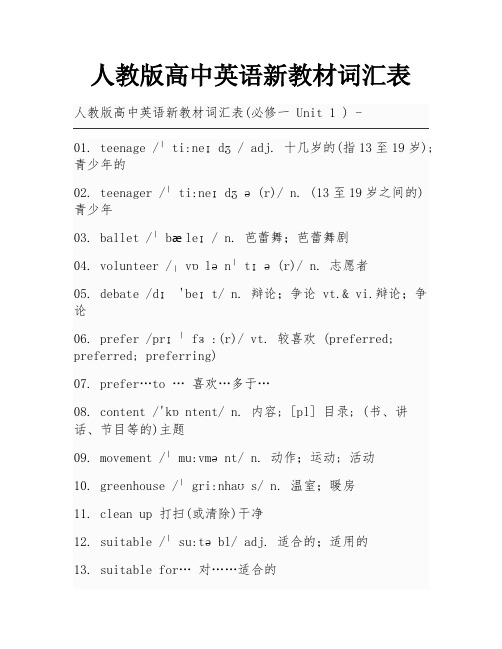
人教版高中英语新教材词汇表01. teenage /ˈti:neɪdʒ/ adj. 十几岁的(指13至19岁); 青少年的02. teenager /ˈti:neɪdʒə(r)/ n. (13至19岁之间的) 青少年03. ballet /ˈbæleɪ/ n. 芭蕾舞;芭蕾舞剧04. volunteer /ˌvɒlənˈtɪə(r)/ n. 志愿者05. debate /dɪ 'beɪt/ n. 辩论;争论 vt.& vi.辩论;争论06. prefer /prɪˈfɜ:(r)/ vt. 较喜欢 (preferred; preferred; preferring)07. prefer…to …喜欢…多于…08. content /'kɒntent/ n. 内容; [pl] 目录; (书、讲话、节目等的)主题09. movement /ˈmu:vmənt/ n. 动作;运动; 活动10. greenhouse /ˈgri:nhaʊs/ n. 温室;暖房11. clean up 打扫(或清除)干净12. suitable /ˈsu:təbl/ adj. 适合的;适用的13. suitable for…对……适合的14. actually /ˈæktʃuəli/ adv. 事实上; 的确15. challenge /ˈtʃæləndʒ/ n. 挑战;艰巨任务 vt. 怀疑;向……挑战16. title /ˈtaɪtl/ n. (书、诗歌等的)名称;标题;职称;头衔17. topic/ˈtɒpɪk/ n. 话题; 标题18. freshman /ˈfreʃmən/ n. (especially NAmE)(中学)九年级学生;(大学)一年级新生19. confusing /kənˈfju:zɪŋ/ adj. 难以理解的;不清楚的20. confuse /kən'fju:z/ vt. 使糊涂;使迷惑21. confused /kənˈfju:zd/ adj. 糊涂的;迷惑的22. fluent /'flu:ənt/ adj. (尤指外语)流利的;熟练的23. graduate /'ɡrædʒʊeɪt/ vi. & vt.毕业;获得学位/'ɡrædʒʊət/ n.毕业生24. remend /ˌrekəˈmend/ vt. 建议;推荐;介绍25. sign up ( for sth) 报名(参加课程)26. advanced /ədˈvɑ:nst/ adj. 高级的;高等的;先进的27. advance /ədˈvɑ:ns / n. 前进;发展 vi. 前进;发展vt. 发展;促进28. literature /ˈlɪtrətʃə(r)/ n. 文学; 文学作品29. extra-curricular /'ekstrəkə'rɪkjulə/ adj. 课外的; 课程以外的30. extra /'ekstrə/ adj. 额外的;附加的31. obviously /ˈɒbviəsli/ adv. 显然地;明显地32. quit /kwɪt/ vi. & vt.(quit, quit) 停止;戒掉;离开(工作职位、学校等)33. responsible /rɪˈspɒnsəbl/ adj. 负责的;有责任的34. responsibility /rɪˌspɒnsəˈbɪləti/ n. 责任;义务35. be responsible for… 对……负责36. solution /səˈlu:ʃn/ n. 解决办法; 答案37. schedule /ˈʃedju:l/ n. 工作计划;日程安排 vt. 安排;预定38. editor /ˈedɪtə(r)/ n. 主编;编辑;编者39. plate /pleɪt/ n. 盘子,碟子40. adventure /ədˈventʃə(r)/ n. 冒险; 奇遇41. youth /ju:θ/ n. 青年时期; 青春42. survival /səˈvaɪvl/ n. 生存;幸存;幸存事物43. expert /'ekspɜːt/ n. 专家;行家adj.熟练的;内行的;专家的44. behaviour /bɪˈheɪvjə(r)/ n. 行为; 举止45. generation /ˌdʒenəˈreɪʃn/ n.一代(人)46. attract /ə'trækt/ vt. 吸引;引起……的注意(或兴趣)47. be attracted to…喜爱48. focus /ˈfəʊkəs / vi.& vt. 集中(精力、注意力等);(使)调节焦距n. 中心;重点;焦点49. focus on…集中;特别关注50. addicted /əˈdɪktɪd/ adj. 有瘾的;上瘾的;入迷的51. addict /ˈædɪkt/ n. 对…入迷的人;吸毒成瘾的人52. addicted to…对……很入迷53. adult /ˈædʌlt/ n. 成年人 adj.成年的;成熟的Have A Dictation!单词听默写01. ___ /ˈti:neɪdʒ/ adj. 十几岁的(指13至19岁); 青少年的02. ___ /ˈti:neɪdʒə(r)/ n. (13至19岁之间的) 青少年03. ___ /ˈbæleɪ/ n. 芭蕾舞;芭蕾舞剧04. ___ /ˌvɒlənˈtɪə(r)/ n. 志愿者05. ___ /dɪ 'beɪt/ n. 辩论;争论 vt.& vi.辩论;争论06. ___ /prɪˈfɜ:(r)/ vt. 较喜欢 (preferred; preferred; preferring)07. ___ 喜欢……多于……08. ___ /'kɒntent/ n. 内容; [pl] 目录; (书、讲话、节目等的)主题09. ___ /ˈmu:vmənt/ n. 动作;运动; 活动10. ___ /ˈgri:nhaʊs/ n. 温室;暖房11. ___ 打扫(或清除)干净12. ___ /ˈsu:təbl/ adj. 适合的;适用的13. ___ 对……适合的14. ___ /ˈæktʃuəli/ adv. 事实上; 的确15. ___ /ˈtʃæləndʒ/ n. 挑战;艰巨任务 vt. 怀疑;向……挑战16. ___ /ˈtaɪtl/ n. (书、诗歌等的)名称;标题;职称;头衔17. ___ /ˈtɒpɪk/ n. 话题; 标题18. ___ /ˈfreʃmən/ n. (especially NAmE)(中学)九年级学生;(大学)一年级新生19. ___ /kənˈfju:zɪŋ/ adj. 难以理解的;不清楚的20. ___ /kən'fju:z/ vt. 使糊涂;使迷惑21. ___ /kənˈfju:zd/ adj. 糊涂的;迷惑的22. ___ /'flu:ənt/ adj. (尤指外语)流利的;熟练的23. ___ /'ɡrædʒʊeɪt/ vi. & vt.毕业;获得学位/'ɡrædʒʊət/ n.毕业生24. ___ /ˌrekəˈmend/ vt. 建议;推荐;介绍25. ___ 报名(参加课程)26. ___ /ədˈvɑ:nst/ adj. 高级的;高等的;先进的27. ___ /ədˈvɑ:ns / n. 前进;发展 vi. 前进;发展 vt. 发展;促进28. ___ /ˈlɪtrətʃə(r)/ n. 文学; 文学作品29. ___ /'ekstrəkə'rɪkjulə/ adj. 课外的; 课程以外的30. ___ /'ekstrə/ adj. 额外的;附加的31. ___ /ˈɒbviəsli/ adv. 显然地;明显地32. ___ /kwɪt/ vi. & vt.(quit, quit) 停止;戒掉;离开(工作职位、学校等)33. ___ /rɪˈspɒnsəbl/ adj. 负责的;有责任的34. ___ /rɪˌspɒnsəˈbɪləti/ n. 责任;义务35. ___ 对…负责36. ___ /səˈlu:ʃn/ n. 解决办法; 答案37. ___ /ˈʃedju:l/ n. 工作计划;日程安排 vt. 安排;预定38. ___ /ˈedɪtə(r)/ n. 主编;编辑;编者39. ___ /pleɪt/ n. 盘子,碟子40. ___ /ədˈventʃə(r)/ n. 冒险; 奇遇41. ___ /ju:θ/ n. 青年时期; 青春42. ___ /səˈvaɪvl/ n. 生存;幸存;幸存事物43. ___ /'ekspɜːt/ n. 专家;行家adj.熟练的;内行的;专家的44. ___ /bɪˈheɪvjə(r)/ n. 行为; 举止45. ___ /ˌdʒenəˈreɪʃn/ n.一代(人)46. ___ /ə'trækt/ vt. 吸引;引起……的注意(或兴趣)47. ___ 喜爱48. ___ /ˈfəʊkəs / vi.& vt. 集中(精力、注意力等);(使)调节焦距n. 中心;重点;焦点49. ___ 集中;特别关注50. ___ /əˈdɪktɪd/ adj. 有瘾的;上瘾的;入迷的51. ___ /ˈædɪkt/ n. 对…入迷的人;吸毒成瘾的人52. ___ 对……很入迷53. ___ /ˈædʌlt/ n. 成年人 adj.成年的;成熟的。
汉语言文学专业英语词汇
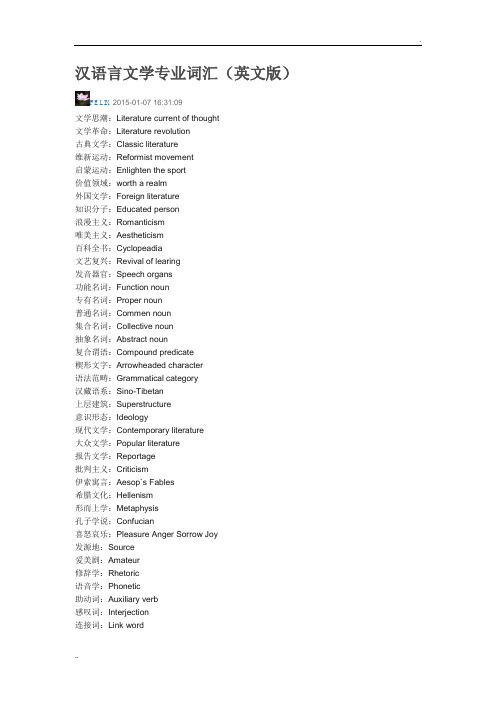
汉语言文学专业词汇(英文版)FELIX2015-01-07 16:31:09文学思潮:Literature current of thought文学革命:Literature revolution古典文学:Classic literature维新运动:Reformist movement启蒙运动:Enlighten the sport价值领域:worth a realm外国文学:Foreign literature知识分子:Educated person浪漫主义:Romanticism唯美主义:Aestheticism百科全书:Cyclopeadia文艺复兴:Revival of learing发音器官:Speech organs功能名词:Function noun专有名词:Proper noun普通名词:Commen noun集合名词:Collective noun抽象名词:Abstract noun复合谓语:Compound predicate楔形文字:Arrowheaded character语法范畴:Grammatical category汉藏语系:Sino-Tibetan上层建筑:Superstructure意识形态:Ideology现代文学:Contemporary literature大众文学:Popular literature报告文学:Reportage批判主义:Criticism伊索寓言:Aesop`s Fables希腊文化:Hellenism形而上学:Metaphysis孔子学说:Confucian喜怒哀乐:Pleasure Anger Sorrow Joy发源地:Source爱美剧:Amateur修辞学:Rhetoric语音学:Phonetic助动词:Auxiliary verb感叹词:Interjection连接词:Link word逻辑词:Logical word里程碑:Milestone拉丁语:Latin田园诗:Idyl无名氏:Annymous person真善美:Truth Goodness Beauty英语分类词汇:文学相关词汇classical literature 古典文学contemporary literature 现代文学popular literature 大众文学light literature 通俗文学folklore 民间文学saga (river) novel 长篇小说short novel, long short story 中篇小说short story 短篇小说love story 爱情小说deterctive story 侦破小说mystery story 怪诞小说whodunit 推理小说humorous story 幽默小说historical novel 历史小说essay 随笔book of travels 游记reportage 报告文学criticism 评论best seller 畅销书anthology 选集the complete works(of) 全集edition, printing 版masterpiece 杰作copyright 版权, 著作权deluxe binding 精装flat stitching 平装smyth sewed 线装humanities 人文学科writer 作家book 书volume 卷theatre 戏剧(美作:theater)drama 话剧comedy 喜剧tragedy 悲剧farce 滑稽剧play 剧本the three unities 三一律(一个情节,一个地点,一个时间) playwright 编剧act 幕scene 场plot 情节Appendix 1 A Glossary of Linguistic TermsAabbreviation []n. 缩写.缩写词.略语ablative []n.夺格a.夺格的absolute []a.独立的.独立成分absolute clause 独立从句abstract nouns 抽象名词accent []n.口音.重音.(诗歌中词或音节的)重读accidence []n.1.词形变化.字形变化2. (学科的)初步.入门accommodation []n.调适.接纳accusative []a.直接宾格的n.直接宾格(受格)acoustic []a.听觉的.音响的.声学的(---feature/cue声学特征)acquisition []n.获得.习得acronym []n.首字母缩略字.缩略词active []n.主动语态actor []n.动作者.行动者(actor—action—goal)addition []n. 加.附加.添加address []n. 称呼(forms/terms of address 称呼语)addressee []n. 受话人,收信人,收件人addresser []n. 发话人,发言人,发信人.adjacency pair 相邻语对adjective []n.形容词a.形容词的adjunct []n.附加语.修饰语.修饰成分adnominal []a.(定语)修饰名词的.形容词的.形容名词的adverb []n. 副词;状语adverbial []a. 副词的,作副词用的adversative []a.反意的.相反的n.反义字(转折语) affirmative []n.肯定词.肯定语affix []n1.附加物.添加物2.字缀.词缀(affix hopping 词缀跳跃) affixation[]n. 附加.附加法.词缀附加法affricate []n.塞擦音agent (agentive) 施事agreement []n. (人称.性别.数.格的)一致airstream []n.气流alliteration []n.头韵(法)allomorph []n.同质异形体.词.语素变体allophone []n.同位音.音位变体allophonic variation 音位变体alveolar []n. 齿龈音,齿槽音.alveolar ridge 齿龈ambiguity []n.含混,歧义ambiguous歧义的anacoluthon []n.改变说法.错格.句法结构前后不一anadiplosis []n.反复法.顶真analogical []a.类似的.类推的analogical creation 类推造字anapaest []n.抑抑扬格.弱弱强格.短短长格anaphora []n. 复指.首语(句)重复法annotation []n. 注解.注释antecedent []n. (关系代词的)先行词antithesis []n. 1. 对立面;对立2. (修辞学)对语,对偶,对句antonomasia []n. 代称,称呼替换antonym []n. 反义词,反义现象aphorism []n.格言.警句.箴言aposiopesis []n.话语中断,说话中断法apostrophe []n. 1.呼语2.撇号3.省略符号4.所有格符号appellative []a.1.名称的2.通称的n.通称名词.普通名词apposition []n. 1.同位语2.并置appropriateness []n. 得体.适合.适当.相称arbitrariness []n. 任意性archaism []n.古体,拟古,古语argot []n.行语,暗语,黑话article []n.冠词articulation []n. (清楚的)发音.发出的(辅)音.发音动作articulator []n. 1.发音清楚的人或物2.发音器官articulatory []a.发音清晰的.与发音有关的aside 旁白,私语,离题话aspect []n. (动词的) 体. 时态. 时间aspirated []a.伴有h音的.送气音的.吐气.送气assimilation []n.同化aureate []a.绚丽的(-- diction,绚丽辞令– style绚丽体)assonance []n. 1. 谐音2. (诗的)准押韵.半谐音attributive []a. 1.归属的.属性的2.定语的n.定语auxiliary []a. 辅助的.附属的.从属的n.助词auxiliary verb 助动词Bback-formation 逆构词法base form 基础形式base component 基础部分basic form 基本形式behaver 行为者behavioural process 行为过程behaviourism 行为主义bilabial []a.双唇音的n. 双唇音bilabial nasal 双唇鼻音bilateral []a.双边的.双边音bilateral opposition 双边对立bilingualism [] n.双语现象binary []a. 二元的.由二部分构成的(-- feature 二分特征) binomial []a. 二项式的n.二项式blade []n.舌叶.舌面前部blank verse 无韵诗bleaching []n.词义淡化blending []n.混合.混成法.裁切block language 块语、标题式语言(有限语境中使用缩略结构如No smoking) borrow(ing) 借用.借词bound clause粘附句bound morpheme 粘着语素bounding theory 界限理论bracketing 括号法broad transcription 宽式音标broadening 词义扩大Ccalque []n.语义转借.译借vt.转借(语义).仿造语cardinal[]n基数词cardinal vowel 基本元音category []n范畴(categorical component 范畴成分)causative []a.使役的n.使役动词cavity []n.腔clause 小句.从句click 吸气音.咂音clipping []n.缩略closure []n.关闭.闭塞cluster []辅音丛coarticulation 协同发音coda []n.节尾.韵尾code 语码.信码cognate []n.同源词.同根词.同系语言cognitive psycholinguistics 认知心理语言学cognitive psychology 认知心理学cognitive system 认知系统coherence 连贯.相关.关联cohension 衔接collapse [] 叠合collective []n.集合名词colligation []n. 概括.搭连collocation []n.组合.搭配command []命令(句)commissive 承诺语common普通的.共同的(--- core 共核)(--- noun 普通名词)comparative [] a比较的.比较级的competence []n.语言能力complement(ation) 补语complementary互补.相反component 组成部分,成分componential 组成部分的composition 组构compound(ing) 复合;复合词(句)conative []a. 意动的concord []n. 协调.一致(关系)conditional []n.条件句.条件语congruence []n.重合conjugate []vt.列举(动词)的词形变化conjunct []a. 连接副词conjunction []n.连词.连接词connotation []n.含蓄.言外之意【逻】内涵consonant[]n.辅音.辅音字母a.辅音的constative []a. 陈述的.表述的constituent []n.成分.结构成分construction (construct) 构建content (ive) 内容.实义(词)contrast(ive) 对立.对比convention(al) 常规;规约conversation 会话conversationalconversion 类转.变换coordinate /coordination/coordiative 并列copula []n.系词copulative []a.连系的.作系词的n.系词co-referential(ity) 同指coronal []n.舌冠(音).舌尖音corpus []n. 1.文集.全2..躯体(尤指尸体) 3.语料语料库.素材corpora[] (corpus的复数)correlative []a.相关的n.关联词count [] 可数的,countable/uncontable 可/不可数名词couplet []n. 对句.双韵covert []隐性的Ddactyl []n. (英诗的)扬抑抑格.长短短格dative []a.与格的n.与格.与格语dative movement 与格移动declarative []a. 1. 宣言的.布告的.申报的.陈述的2.陈述的decode []vt. 译解(密码)deductive []a. 推论的.演绎的defeasibility 消除可行性definite []a.1. 明确的.确切的2. 一定的.肯定的3. 限定的deictic []a. 直证的.直指的(deixis)denotation []n. 1. 意义.本义2. 表示3. 名称.符号dental []a. 齿音的n.齿音dentalization 齿音化derivation []n.诱导.来历.起源调查.语言derivational []a.诱导的. 衍生的;引出的determiner []n.限定词deviant []a. 越轨的n.不正常者.变异物.变体deviation 偏离;变异devoice []vt.使(有声之音)变为无声之音devoicing 清音化diachronic []a.历时的diachronic linguistics 历时语言学diacritic []a.有区别的.能区分的.辨别的n.区别发音符号dialect []n. 方言.土话dialectology 方言学diphthong []n.双元音.复合元音direct object 直接宾语direct speech直接言语discourse []n.语段.语篇;话语discrete []a. 1. 分离的.不连接的2.抽象的disjunction []n. 分离.分裂displacement []n.移位.置换.取代dissimilation []n. 1. 异化2.异化作用3.异化distinguish []vt.区别.识别把...区别分类distinguisher 辩义成分domain []n. 领域.范围dorsal []a.背部的.背侧的舌背音.舌中音dorsum []n.背.背状部分.舌面(舌尖以后之部分)dual []n. 1. 双数2. 双数词dualistic []a. 二元的.二元论的duality 二重性Eejective []a. 喷出的.外射的n.外爆音ellipsis []n.省略.省略部分elliptic(al) []a. 1. 椭圆的2.省略的encode []vt. 1. 把...译成电码(或密码)endocentric []a.向心的.内向的epenthesis []n.增音.插入字母epithet []n. 1. 表示特征的修饰词2. (描述性的)称号equipollent []a.相等的n. 相等物equivalence 相等equivoque []n. 双关语.模棱两可的词句.语义双关euphemism []n.. 婉转说法.委婉(词)语euphony []n. 声音的和谐.谐音.悦耳语音exocentric []a. 外心的exocentric construction 外向结构extensive []引申的;扩展的Ffeasibility []n.可行性.可能性feature []n. 特征.特色felicity []n. 1. 幸福2. (措辞等的)得体.巧妙.恰当的语句feminine []a.阴性的figurative []a. 1. 比喻的.象征的2. (文章等)多比喻的figurative language 比喻性语言;象征性语言figures of speech 修辞手段;修辞格finite []a. 1. 有限的2.有穷的3.限定的n. 有限.有限之物flap [] 闪音flexibility []n. 易曲性.适应性.灵活性.弹性fricative []a. 摩擦的n. 摩擦音friction 摩擦function 功能fusion []n.溶合fuzzy []a. 1. 有绒毛的2. 模糊不清的Ggender []n. 1.【语】性2.性别gender difference 性别差异generalization []n. 普遍化.概括.综合.归纳generative []a.生殖的.有生产力的generative grammar 生成语法genitive []a.属格的n.属格global []a. 1. 球状的2. 全世界的3. 总体的global task 整体任务glottal []a. 1.声门的2. 用声门发声的.喉音glottal stop 喉塞音gradable []a. (形容词)有比较级和最高级的grammar []n. 语法grammatical []a. 语法的group []n.群.组.类词组guttural []a.喉咙的.喉音的n. 喉音.喉音字腭音Hhead []n.中心词;中心成分headed construction 中心结构heptameter []n.七音步a. 七音步的hierarchical []a.等级制度的.等级体系的hierarchical structure 等级结构hierarchical system 等级系统hierarchy []n.等级制度.统治集团.级系.阶系holophrastic []a.表句词的.单词句的holophrastic stage 单词句阶段homonym []n.同音异义字.同形同音异义字.同形异义字homophony []n. 同音异义hyperbole []n. 1.修辞的夸张法2.夸张的语句hypercorrection []n.矫枉过正hyponym []n.下位的名称.下义词hypothesis []n.假说. 前提.假设Iiamb []n.抑扬格.短长格iambic pentameter 抑扬格五音步诗行idiom []n1. 惯用语.成语.习惯语2. 方言.土话.(个人特有)用语ill-formed sentences 不合适的句子illocutionary []a.发语词内的.语内表现行为的illocutionary act 话中行为;施为性行为illocutionary force 言外作用;施为作用immediacy assumption 即时假定immediate constituent analysis 直接成分分析法imperative []a.祈使法的.祈使语气.命令的implicate []vt.意味着.暗指n. 包含的事物.暗含的论断implication 蕴涵;含义implosive []a.闭塞音的n.内爆发音inanimate []a.无生命的indefinite []a.不定的.未定的indicative []a.陈述的n.陈述语气.陈述语气的动词形式inference []n. 推论.推断[inferential []a. 推理的.推论的infinitive []n.不定式a.不定式的infix []n. 插入词.中缀inflection []n. 1. 变音.转调2. 弯曲.向内弯曲innateness []n. 天生.天赋intensifier []n. 1. 增强器.增强剂2. 加强者3.强调成分intensive []a. 加强的.密集的.加强语意的n.强调成分interdental []a. 在牙齿间的2.齿间音的n.齿间音interface []n. 界面.分界面interjection []n. 感叹词.感叹语interlanguage []n. 国际语言Interlingua []n.人工国际语之一interlocutor []n. 对话者internal []a. 内的.内部的international phonetic alphabet. IPA 国际音标interpersonal []a. 人与人之间的interpersonal function 人际功能interrogative []a. 疑问的.质问的n.疑问词intonation []n. 语调.声调intransitive []a.不及物的n.不及物动词intrinsic []a.本身的.本质的.固有的.内在的invariable []a. 不变的.恒定的.一律的inversion []n.反向.倒置.倒转2.倒装法IPA chart 国际音标图IPS symbol 国际音标符号J K Ljargon []n.黑话;行语kernel []n.核心.要点keyword关键词label []n. 标记.符号. 称号.绰号labial []a. 唇的.唇音的n. 唇音labiodental 唇齿音language []n.语言larynx []n.喉lateral []a.旁流音的.侧音的lateral sounds侧音lax []a. (元音)松弛的n.松弛的元音lax vowel 松元音letter []n字母level []n. 层,级,平面lexeme []n. 词汇.语汇单位.词位;词素lexical []a. 1. 词汇的.语词的2. 词典的.词典编纂的lexicon []n. 1. 词典2. 语汇3. 词素lexis []n. (某一语言的)词语(层)liaison [] 连音linear []a. 线的.直线的linguistic []a.. 语言的.语言学的lip rounding 圆唇化literal []a. 照字面的.原义的loan translation 翻译借词loanblend 混合借词loanshift 转移借词loanword 借词Mmacro []a. 1. 巨大的.大量的2. 宏观的.main clause 主句manner of articulation 发音方式marked 标记的masculine []a. 1. 男性的.男子的2阳性的maxim []n. 格言.箴言.座右铭manner maxim 方式准则meaning 意义meaning potential 意义潜势meaning shift 转移mental (processs) 思维过程;心理过程mentalism []n.心灵主义message 信息metafunction 元功能metalinguistic 元语言的metaphor 隐喻metathesis []n. 1.音位转换2.交换反应.置换metonymy []n.转喻metre []n.格律.韵律.拍子metrical patterning 韵律格式9.3.3mind 思维minimal []a.最小的.极微的n.极简抽象派艺术(或其作品)mirror maxim 镜像准则mistake 错误modal []a. 1.形态上的.形式的2.语气的.情态的3.典型的modal subject 语气主语modal verb 情态动词modality []n. 1. 形式.情态程序3.物理疗法4. 主要的感觉modification []n.修饰.变异modifier []n.1. 修改者2. 修饰词语3.修饰基因4.改性剂monomorphemic 单语素的monophonemic 单音位的monophthong 单元音monosyllabic 单音节的mood 语气morpheme []n.语素.词素(语言中最小的字义单位)morphemic []a.词素的.语素的morphological []a.形态学的.形态的morphology []n.形态学morphophonemics []n词素音位结构2. 词素音位学mother tongue 母语;本族语motivation 动因;动机multilingualism 多语制;多语现象Nnasal []a.1. 鼻的2. 鼻音的n.. 鼻音.鼻音字母nasal cavity 鼻腔nasal sound 鼻音nasal stop 鼻塞音nasal tract 鼻道nasality 鼻音性nasalization 鼻音化negation []n. 1. 否定2. 反对.反驳3. 不存在4. 对立面negative []a.否定的.否认的. 反面的.消极的n.否定语negative interference 负面干扰negative marker 否定标记negative transfer 负转移neutralize []vt. 1. 使无效.抵消2. 使中立化neutralizable opposition 可中立对立node []n. 1. 结.节2. 中心点.交叉点nominal []a.名词性的n. 名词性的词nominal group 名词词组nominalization 名词化nominative []a.主格的n.主格.主格词non-conventionality 非规约性non-detachability非可分离性non-linear phonology 非线性音系学non-linguistic entity 非语言实体non-pulmonic sound 非肺闭塞音non-reciprocal discourse 非交替性语篇non-reflexive pronoun 非反身代词nonsense word stage 无意义词语阶段nonverbal cues 非言语提示norm 规范notation system 标写系统notion 意念noun phrase 名词短语noun 名词Oobject 宾语object-deletion 宾语省略objective case 宾格objectivity 客观性obligatory 强制性observational adequacy 观察充分性abstruction 阻塞octametre 八音步诗行onomatopoeia []n. 1.拟声.象声词2.拟声法onset 节首辅音open class 开放类open syllable 开音节operative 可操作性operator 操作词oppositeness relation 对立关系opposition 对立optimal relevance 最适宜关联option 选择optional 可选择的oral cavity 口腔oral stop 口阻塞音ordinal numeral 序数词origin of language 语言起源orthography []n.1. 正字法.拼字法2. (几何)正射影(法) ostensive communication 直示交际overgeneralization 过分法则化Ppalate []n. 1.上颚2. 味觉3. 趣味.嗜好palatal []a.上颚(音)的.颚(音)的n. 上颚音.颚音palatal-alveolar 腭齿龈音palatalization []n.腭音化paradigm []n.1.范例2. (名词或动词)词形变化(表) paradigmatic []a.1.范例的2.词形变化(表)的paradigmatic relation 聚合关系paraphrase []n. 1. 释义.意译.改述vt. vi.. 释义.意译participant 参与者particle []n.虚词(包括某些副词.冠词.介词.连词等).字首.字尾partitive []a. 1. 区分的2.表示部分的n.表示部分的词passive []n.被动语态被动态的动词pattern 模式patterning 制定模式pause 停顿peak (节)峰perceptual []a.感知的.知觉的perceptual span 感知时距perfectionism 完善主义perfective 完成体performative (verb) 行事性动词person 人称personal (function) 自指性功能pharyngeal []a.1.咽部的2.喉音的n.喉音pharynx []n.咽头phatic []a. 交流感情的.应酬的phatic (communion) 寒暄交谈;phoneme []n.音素.音位phonetic []a. 1.语音的.语音学的2. 语音差异的phonetic alphabet 音标phonetic form component 语音形式部分phonetic similarity 语音相似性phonetic symbol 语音符号phonetic transcription 标音(法)phonetics []n. (用作单)语音学phonologic []a.音位学的.语音体系的phonological process 音位过程phonology []n. 音位学.语音体系phrase []n. 短语.词组pidgin []n.1. (并用两种或多种语言的)混杂语.洋泾浜语2.事儿plosion []n】爆破发音.爆破plosive []n.a.破裂音(的)plural []a.复数的pluralism []n.1.兼职.兼任2.多重性.多元论plurality []n.1. 复数.多数.多重性2.复数(形式) polysyllabic []a. 多音节的Portugese 葡萄牙语positive transfer 正移转possessive []a.1.拥有的.占有的2.所属关系的.所有格的postdeterminer 后限定词pragmatic []a.1. 实际的.实干的2. 实用主义的pragmatics 语用学Prague School 布拉格学派predeterminer 前限定词predicate []n..谓语.述部a.谓语的.述部的prefix []n.字首.前缀(人名前的)称谓premodifier 前修饰语preposition []n.1.介词.前置词prepositional []a.. 介词的.前置词的prepositional phrase 介词短语prescriptive []a. 规定的.因时效而获得的presupposition []n.预想.假定.前提primary []a. 首要的.主要的priva principle []n. 原则.原理process 过程pro-form 代词形式;替代形式pronominal []a. 代词的pronoun 代词pronunciation 发音pronunciation dictionary 发音词典proposition 命题prosodic []a. 作诗法的.韵律学的psycholinguistics 心理语言学psycholinguistic-sociolinguistic approach 心理-社会语言学方法pulmonic []a. 肺病的pulmonic sound 肺闭塞音Putonghua 普通话Qquality 质量quality maxim 质量准则quantity 数量quantity maxim 数量准则quantifier 数量词quantitative analysis 定量分析quantitative paradigm 数量变化表quatrain []n. 四行诗quirk []n.1. 突然的转变2. 字的花体3. 怪癖4. 借口Rrange 范围rank 级rationalism 理性主义raw data 原始素材R-based implicature 基于关联的涵义realisation 体现received pronunciation. RP 标准发音receiver 受话者;信息接受者recency effectrecognition 识别recursion []n.【数】递回.递回式.循环.可溯recursive []a.】递归的.可溯的;还原的recursiveness 递归性reference 所指参照referential []a.1 指示的所指的reflexive []n..反身动词.反身代词a.反身的regional dialect 地域方言register []n.语域regressive []a.1.后退的.逆行的.退化的2. 回归的relative clause 关系分句.关系从句relative pronoun 关系代词relative uninterruptibility 相对的非间断性relevance theory 关联理论reliability 信度repetition 重复residue []n.残余.剩余.剩余成分restricted []a. 受限制的.被限定的restricted language 限制性语言retrieval []n.1. 取回.恢复2. 纠正.补偿检索retroflex []a.1. 反折的.后翻的2. 卷舌(音)的n. 卷舌音reverse rhyme 反陨rhyme 韵;韵角;压韵rhythm 韵律;节奏role 角色root 词根root morpheme 词根语素round vowel 圆元音rules of language 语言规则Ssameness relation 相同关系Sanskrit []n. 梵文.梵语a. 梵文的.梵语的Sapir-Whorf Hypothesis 萨丕尔-沃夫假设Saussure 索绪尔scale of delicacy 精密阶schema []n.1. 轮廓.概要.略图2.先验图式3.图式second language acquisition 第二语言习得secondary cardinal vowel 次要基本元音secondary stress 次重音segment []n.语流中的一个音素(或单个音)selection restriction 选择限制selectional rules 选择规则self-reflexive 自反身semantic []a.. 语义的.语义学的semantic triangle 语义三角semantics 语义学semi-consonant 半辅音semiotic []a.1.符号学的2.症状的semiotics 符号学semi-vowel 半元音sense 意义sentence 句子sentence fragments 句子成分sentence meaning 句义sentence memory 句子记忆sentence stress 句重音sentence structure 句子结构sentential calculus 句子演算setting 场景sibilant []a.1.丝丝作响的2.发丝音的n.1.丝丝音2.发丝音辅音sign 符号signified 所指.受指signifier 能指.施指simile []n. (修辞)直喻.明喻simultaneity 同时性singular 单数slot 空缺soft palate 软腭sonnet 十四行诗sonorant []n..响音sonority []n.1. 响亮2. (声音的)响亮程度sound 语音Spanish 西班牙语Speaker 说话者speech 言语spelling 拼写.拼法split infinitives 分裂的不定式spoken corpus 口语语料库spoken language 口语spondee []n.扬扬格spoonerism []n.斯本内现象(即字音的无意互换现象) Standard English 标准英语standardization 标准化statistical analysis 统计分析status 地位stem 词干stimulus 刺激stimulus-response 刺激反应stop 闭塞音stratification []n.成层.阶层的形成stress 重音structure 结构stylistics 文体学subcategorize 次范畴subject 主语subject-deletion 主语省略subjectivity 主观性subjunctive []a.虚拟的n.虚拟语气subordinate construction 从属结构subordination 从属substitutability 替代性substitution 替换suffix 后缀superlative degree 最高级superordinate 上坐标词suprasegmental feature超语段特征syllabic []a.1. 音节的.构成音节的n.音节主音syllabification []n.1. (语音)分音节2. 分音节法syllable []n. 音节syllabus []n. 教学大纲.课程大纲2.要目syllogism []n.1.三段论.演绎推理2.推断3.诡辩.狡辩symbol 符号synchronic []a. 同时的.共时的synonym []n. 同义字.类义字(分类学中的)同物异名synonymous []a. 同义的.同义词性质的synonymy []n. 同义.同义词研究syntax []n.语法.句法2. (组成部分的)有条理(或系统)的排列syntactic []a. 按照句法的.句法的Ttacit []a1. 缄默的.不说话的2. 不明言的.默示的tacit knowledge 默契的知识tagmeme []n.法位.序位tagmemics 法位学tautology []n. 同义反复.重复.赘述template []n. 模块tense vowel 紧元音tense 时态tetrameter []n. 四音步诗行text 语篇textual 语篇功能theme []n. 1.论题.话题.题目2.主题.主题思想.题材3.词干.主位tone 声调.音调tongue height 舌高tongue position 舌位tongue tip 舌尖topic 主题trace theory 轨迹论transcription []n. 1.抄写.誊写2.副本音标.标音transfer 移转transformation 转换transitivity []n.动词的及物性trill []n.颤音trochee []n.扬抑格.长短格trope []n.转义.比喻truth condition 真值条件truth value 真值tu/vous distinction 你/您区别turn length 话语轮次长度turn quantity 话语轮次数量turn-taking 依次发言two-place predicate 二位谓语two-word utterance 二词话语typology 类型学UUnaspirated 不松气的underlying form 底层形式underlying representation 底层表达uninterruptibility 非中断性universal quantifier 普遍限量词universal 普遍现象universality 普遍性universals of language 语言的普遍现象unmarked 未标记的unrounded vowel 非圆元音urban dialectology 都市方言学utterance []n.1.发声.表达2.说话方式.语调3言辞.言论.话语utterance meaning 语句意义uvula []n. 悬雍垂.小舌uvular []a.小舌的.小舌音的Vvalidity 效度variable 可变化的variable word 可变化词variation变异variety 变体;语体velar []a.1膜的2.软颚音的n. 软颚音velarization 腭音化velum []n.1.软颚2.菌膜.缘膜verb 动词verb phrase 动词短语verbal communication 言语交际verbal process 言语过程verbiage []n.1. 废话.冗词2. 用语.措词vernacular []n.本国语.本地话.方言.行话.日常用语.白话vernacular language education 本地化教育vocabulary 词汇vocal []a.声的.声音的.元音的.浊音的n.元音.浊音vocal cord 声带vocal organ 发音器官vocal tract 声道vocative []a. 称呼的.呼格的n.呼格voice 语态voiced consonant 浊辅音voiced obstruent 浊塞音voiced (sound) 浊音voiceless consonant 清辅音voiceless obstruent 清塞音voiceless(sound) 清音voicing 浊音化,有声化vowel []n. 1.元音2. 元音字母vowel glide 元音音渡WWh-interrogative 特殊疑问句women register 女性语域.word 词word class 词类word formation 词语形成word group 词组word meaning 词义word order 词序word recognition 词语识别word formation 词语形成word-for-word 逐词翻译wording []n. 措辞.用语written language 书面语written text 篇章XY ZYes--no interrogative 是非问句yes--no question 是非问句zero 零.零形式zeugma []n. 轭式搭配,轭式修饰法..。
考研英语大纲5500词汇表(精选5篇)
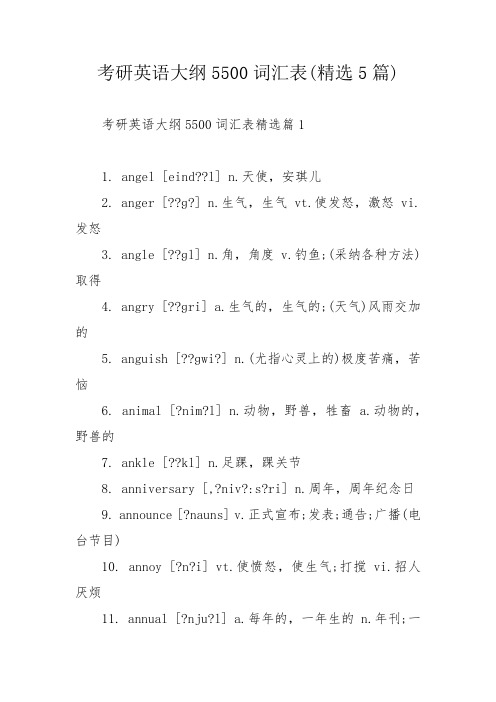
考研英语大纲5500词汇表(精选5篇)考研英语大纲5500词汇表精选篇11. angel [eind??l] n.天使,安琪儿2. anger [??ɡ?] n.生气,生气 vt.使发怒,激怒 vi.发怒3. angle [??ɡl] n.角,角度 v.钓鱼;(采纳各种方法)取得4. angry [??ɡri] a.生气的,生气的;(天气)风雨交加的5. anguish [??ɡwi?] n.(尤指心灵上的)极度苦痛,苦恼6. animal [?nim?l] n.动物,野兽,牲畜 a.动物的,野兽的7. ankle [??kl] n.足踝,踝关节8. anniversary [,?niv?:s?ri] n.周年,周年纪念日9. announce [?nauns] v.正式宣布;发表;通告;广播(电台节目)10. annoy [?n?i] vt.使愤怒,使生气;打搅 vi.招人厌烦11. annual [?nju?l] a.每年的,一年生的 n.年刊;一年生植物12. anonymous [?n?nim?s] a.匿名的,无名的,姓氏不明的13. another [?n?e?] a.另一个,又,再 pron.另一个,类似的一个14. answer [ɑ:ns?, ?n-] vt.回答,答复,答案 v.回答,答复,响应15. ant [?nt] n.蚁;蚂蚁16. antenna [?nten?] n.(无线电或电视的)天线17. anticipate [?ntisipeit] vt.预料;期望;预先考虑;抢先;提前使用18. antique [?nti:k] a.古式的,过时的n.有价值的古物,古董19. anxiety [??zai?ti] n.挂念,焦虑,着急,忧虑;渴望,热望20. anxious [?nk??s] a.焦虑的,担忧的;急于(得到的),渴望的21. any [eni] a.(用于否定句、疑问句等)什么,一些;任何的22. anybody [eni,b?di] pron.(否定句)任何人;(确定句)任凭哪个人23. anyhow [enihau] ad.不管怎么说,无论如何;不论用何种方法24. anyone [eniw?n] pron.(用于疑问句,否定式)任何人25. anything [eniθi?] pron.任何东西(事物);无论什么东西(事物)26. anyway [eniwei] ad.不管怎么说,无论如何;不论以何种方式27. anywhere [enihwε?] ad.无论哪里;(用于否定、疑问等)任何地方28. apart [?pɑ:t] ad.分别,离开,隔开 a.分别的,分隔的29. apartment [?pɑ:tm?nt] n.[英]房间,套间;[美]公寓30. apologise [?p?l?d?aiz] v.(to,for)赔礼,认错31. apology [?p?l?d?i] n.赔礼,认错,辩解,辩护32. appal [?p?:l] v.使惊骇,使恐怖33. apparatus [,?p?reit?s] n.器械,器具,仪器;机构,组织34. apparent [?p?r?nt] a.表面上的,貌似真实的;明显的,明明白白的35. appeal [?pi:l] vi.呼吁,请求;申诉 n.呼吁;申诉;吸引力36. appear [?pi?] vi.消失;出场;问世;仿佛;出版,发表37. appearance [?pi?r?ns] n.消失,露面;外表;(在会议等)作短暂露面38. appendix [?pendiks] n.附录,附属物;阑尾,盲肠39. appetite [?pitait] n.食欲,胃口;欲望,性欲;爱好,趣味40. applaud [?pl?:d] vt.鼓掌欢迎;赞同 vi.鼓掌欢迎,欢呼41. applause [?pl?:z] n.鼓掌;喝彩;夸奖,赞扬42. apple [?pl] n.苹果,苹果树43. appliance [?plai?ns] n.电器;器械,装置;应用,适用44. applicable [?plik?bl, ?plik?-] a.可应用(实施)的;适当的,合适的45. application [,?plikei??n] n.申请,恳求,申请书;应用,实施,有用性46. apply [?plai] vi.(以书面形式)申请;恳求 vt.应用;实施47. appoint [?p?int] vt.任命,委派;指定,商定(时间、地点等)48. appointment [?p?intm?nt] n.约会,商定;任命,委派;委任的职位49. appraisal [?preiz?l] n.对...作出的评价;评价,鉴定,评估50. appreciate [?pri:?ieit] vt.为...表示感谢,感谢;观赏,赏识,评价51. approach [?pr?ut?] v.靠近,接近n.接近;途径,入门;方式,方法52. appropriate [?pr?uprieit] a.适当的,恰当的,特有的 vt.拨给,挪用,盗用53. approval [?pru:v?l] n.批准,通过;赞成,同意54. approve [?pru:v] v.(of)赞成,赞许,同意;批准,审议,通过55. approximate a.近似的 vi.(to)接近56. April (名)四月57. apt [?pt] a.恰当的,适当的;易于…的,有…倾向的58. arbitrary [ɑ:bitr?ri] a.任意的,任性的,主观的;专断的,武断的59. arch [ɑ:t?] n.拱门,桥拱洞 v.拱起,(使)变成弓形60. architect [ɑ:kitekt] n.建筑师;设计师;缔造者;制造者61. architecture [ɑ:kitekt??] n.建筑,建筑学;建筑式样或风格,建筑物62. area [ε?ri?] n.面积;地区,地域;领域,范围63. argue [ɑɡju:] vi.辩论,争辩 vt.辩论,论证;劝说,劝告64. argument [ɑ:ɡjum?nt] n.争辩(吵),辩论;理由;论证65. arise [?raiz] v.消失,发生;(from)由…引起,由…产生66. arithmetic [?riθm?tik] n.算术,四则运算67. arm [ɑ:m] n.手臂,扶手,臂状物 v.武装;配备 n.武器68. army [ɑ:mi] n.军队,陆军,军;大群,大批69. around [?raund] ad.在...四周,处处 prep.在..四周(或四周)70. arouse [?r?uz] vt.唤醒,叫醒;唤起,激起71. arrange [?reind?] v.支配,筹划;整理,使有条理,排列,布置72. array [?rei] n.大量;排列;盛装 v.列阵;装扮;排列73. arrest [?rest] n.逮捕,扣留 vt.逮捕,扣留;阻挡;吸引74. arrival [?raiv?l] n.到达,到来;到达者,到达物75. arrive [?raiv] vi.到达;(时间、大事)到来,发生;达到76. arrogant [?r?ɡ?nt] a.高傲的,自大的77. arrow [?r?u] n.箭,矢,箭状物;箭头符号78. art [ɑ:t] n.艺术,美术;技术,技艺;文科,人文科学79. artery [ɑ:t?ri] n.动脉;干线,要道80. article [ɑ:tik?l] n.文章,论文;条款,条文;物件;冠词81. articulate [ɑ:tikjul?t] a.擅长表达的;有关节相连的 v.清晰地讲话82. artificial [,ɑ:tifi??l] a.人工的,人造的,人为的;虚伪的,做作的83. artist [ɑ:tist] n.艺术家,美术家;(某方面的)能手84. artistic [ɑ:tistik] a.艺术(家)的,美术(家)的;擅长艺术创作的85. as ad.同样地 conj.由于;像...一样 prep.作为86. ascend [?send] vi.慢慢上升,上升vt.攀登,登上87. ascertain [?send] vt.确定,查明,弄清88. ash [??] n.灰,灰末;(pl.)骨灰;(pl.)废墟89. ashamed [??eimd] a.惭愧的,耻辱的,害臊的90. ashore [:] ad.上岸;在岸上,向岸上91. aside [?said] ad.在旁边,到一边 n.旁白;离题的话92. ask [ɑ:sk, ?sk] vt.问,询问;恳求,要求;邀请,约请93. asleep [?sli:p] a.睡觉,睡着(用作表语)94. aspect [?spekt] n.样子, 外表, 面貌, (问题等的)方面95. aspire [?spai?] vi.(to,after)渴望,追求,有志于96. assassinate [?s?sineit] vt.暗杀,行刺;中伤97. assault [?s?:lt] v.猛烈地攻击,攻击 n.突然而猛烈的攻击98. assemble [?sembl] vt.集合,召集;装配;收集 vi.集合,聚集99. assembly [?sembli] n.集合;会议;装配;(美)洲议会的众议院100. assert [?s?:t] vt.断言,宣称;坚持;主见(权利、权威等)考研英语大纲5500词汇表精选篇21. bar [bɑ:] n.条,杆,闩;酒吧;栅,障碍(物) v.闩上,阻拦2. barbecue [bɑ:bikju:] n.烤肉;烤肉用的台架 vt.炙烤(肉等)3. barber [bɑ:b?] n.理发师 vt.为…理发修整 vi.当理发师4. bare [bε?] a.赤裸的,空的;稀有的,仅有的 v.露出,暴露5. barely [bε?li] ad.赤裸裸地,无遮挡地;仅仅,牵强,几乎没有6. bargain [bɑ:ɡin] n.廉价货;交易,契约,合同 v.议价,成交7. bark [bɑ:k] vi.(狗等)吠,叫n.吠声,叫声;树皮8. barn [bɑ:n] n.谷仓,仓库 vt.把…贮存入仓9. barrel [b?r?l] n.桶;枪管,炮管10. barren [b?r?n] a.贫瘠的;不育的;(植物)不结果的;无用的11. barrier [b?ri?] n.栅栏,屏障;障碍(物) vt.把…关入栅栏12. base [beis] n.基础,底部;依据地 v.(on)把…基于13. baseball [beisb?:l] n.棒球14. basement [beism?nt] n.建筑物的底部,地下室,地窖15. basic [beisik] a.基本的,基础的16. basin [beis?n] n.盆,脸盆;内海,盆地17. basis [beisis] n.基础,依据18. basket [bɑ:skit, b?s-] n.筐,篮,篓19. basketball [bɑ:skitb?:l, b?s-] n.篮球,篮球运动20. bat [b?t] n.球拍,球棒,短棒;蝙蝠21. batch [b?t?] n.一批,一组,一群22. bath [bɑ:θ/b?θ] n.沐浴,洗澡;浴室(池,盆) v.(给…)洗澡23. bathe [beie] v.游泳,洗澡,浸,弄湿24. bathroom [bɑ:θrum] n.浴室;盥洗室,卫生间25. battery [b?t?ri] n.电池(组);(器具等的)一组,一套;炮兵连26. battle [b?tl] n.战役,战斗;斗争 v.战斗,斗争,搏斗27. bay [bei] n.海湾,(港)湾28. be [强bi:, 弱bi] v.(就)是,等于;(存)在;到达,来到,发生29. beach [bi:t?] n.海滩,湖滩,河滩30. beam [bi:m] n.(横)梁,桁条;(光线的)束,柱 v.微笑31. bean [bi:n] n.豆;菜豆,蚕豆32. bear [bε?] n.熊 v.忍受,容忍;负担;结果实,生子女33. beard [bi?d] n.胡须34. bearing [bε?ri?] n.轴承;忍受;关系,影响;举止;方向35. beast [bi:st] n.兽,牲畜;凶残的人,举止粗鲁的人36. beat [bi:t] n.敲打;(心脏等)跳动 v.战胜;(心脏等)跳动37. beautiful [bju:tiful] a.美的,漂亮的;精彩的,完善的38. beauty [bju:ti] n.美,漂亮;美人,漂亮的事物39. because [bik?z] conj.由于,由于40. become [bik?m] vi.变成,开头变得vt.适合,同…相称41. bed [bed] n.床,床位;(苗)床,坛;河床,(湖、海的)底42. bee [bi:] n.蜂,蜜蜂;劳碌的人43. beef [bi:f] n.牛肉44. beer [bi?] n.啤酒45. before [bif?:] prep.(指时间)在…以前,在..前面,在..之前46. beforehand [bif?:h?nd] ad.预先,事先47. beg [beɡ] vt.恳求,恳求 vi.恳请,行乞48. begin [biɡin] v.(began,begun)开头,着手49. beginning [biɡini?] n.开头,开端;起源,早期阶段50. behalf [bihɑ:f] n.利益51. behave [biheiv] v.举止,举动,表现;运转,开动52. behavior [biheivj?] n.(behaviour)行为,举止;(机器等)运转状况53. behind [bihaind] prep.在...的背后,(遗留)在..后面;落后于54. being [bi:?] n.生物,生命,存在;55. belief [bili:f] n.信任,信任,信念;信仰,信条56. believe [bili:v] vt.信任,认为 vi.信任,信任,信奉57. bell [bel] n.钟,铃58. belly [beli] n.肚子,腹部;(像肚子一样)鼓起的部分,膛59. belong [bil??] v.(to)属于,附属,隶属;应归入(类别,范畴等)60. beloved [bil?vid, -l?vd] a./n.受爱戴的,尊敬的;爱人,被心爱的人61. below [bil?u] prep.在…下面,在…以下 ad.在下面,向下62. belt [belt] n.(皮)带,腰带;地带63. bench [bent?] n.长凳,条凳;(工作)台,座64. bend [bend] v.(使)弯曲;屈从,屈服 n.弯曲(处),曲折处65. beneath [bini:θ] prep.在…下边,在…之下 ad.在下方66. beneficial [,benifi??l] a.(to)有利的,有益的67. benefit [benifit] n.利益,好处,恩惠 v.有益于;(from,by)受益68. benign [binain] a.(病)良性的,(气候)良好的,慈爱的,和气的69. beside [bisaid] prep.在...旁边,在...四周;和...相比70. besides [bisaidz] ad.此外;并且 prep.于…之外;除…以外71. best [best] a.最好的(good和well最高级) ad.最好地;最72. bet [bet] v.赌,打赌 n.打赌,赌注73. betray [bitrei] v.背叛,出卖;暴露,流露,泄露74. better [bet?] a.较好的 ad.更好(地) v.改良 n.较佳者75. between [bitwi:n] prep.在…之间,在(两者)之间 ad.在中间76. beverage [bev?rid?] n.(水,酒等之外的)饮料77. beware [biwε?] v.当心,谨防78. bewilder [biwild?] v.使迷惑,难住79. beyond [bij?nd] prep.在(或向)...的那边,远于;超出;80. bias [bai?s] n./v.(使有)偏见,偏心,偏袒81. Bible n.圣经82. bibliography [,bibli?ɡr?fi] n.(有关某一专题的)书目;参考书目83. bicycle [baisikl] n.(bike)自行车 vi.骑自行车84. bid [bid] v.祝福;命令,叮嘱;报价,投标 n.出众,投标85. big [biɡ] a.大的;重要的;宽宏大量的;大受欢迎的86. bill [bil] n.账单;招贴,广告;(人员,职称等的)表;钞票87. billion [bilj?n] num./n.(美)十亿,(英)万亿88. bin [bin] n.(贮藏食物等用的)箱子89. bind [baind] v.捆,绑,包括,束缚90. biography [bai?ɡr?fi] n.传记;传记文学91. biology [bai?l?d?i] n.生物学92. bird [b?:d] n.鸟,雀;女人;嘘声93. birth [bɑ:θ] n.诞生,诞生;出身,血统;起源;消失94. birthday [b?:θdei] n.生日;(成方)纪念日95. biscuit [biskit] n.饼干,点心96. bit [bit] n.一点,一些;小块,少量;片刻; [计]位,比特97. bite [bait] v./n.咬,叮 n.一口98. bitter [bit?] a.(有)苦(味)的;苦痛的,厉害的99. bizarre [bizɑ:] adj.异乎寻常的,稀奇奇怪的 100. black [bl?k] a.黑(色)的;黑暗的 n.黑(色);黑暗;黑人考研英语大纲5500词汇表精选篇31. carry [k?ri] v.运输,搬运;传送,传播;领,带2. cart [kɑ:t] n.(二轮货运)马车,手推车3. cartoon [kɑ:tu:n] n.漫画,幽默画;动画片4. carve [kɑ:v] v.(雕)刻5. case [keis] n.箱,盒,容器;状况,事实;病例;案件6. cash [k??] n.现金,现款 v.兑现,付(或收)现款7. cashier [k??i?] n.收银员,出纳员8. cassette [k?set] n.盒子;盒式磁带9. cast [kɑ:s, k?st] v.投,扔,掷,抛;铸造;投票;n.演员表10. castle [kɑ:sl, k?-] n.城堡;(国际象棋中的)车11. casual [k??ju?l] a.偶然的,碰巧的;临时的,非正式的12. casualty [k??ju?lti] n.伤亡人员;受害人;损失的东西;急诊室13. cat [k?t] n.猫;猫科动物;14. catalog [k?t?l?ɡ] n.(catalogue)名目(册) v.编目(录)15. catastrophe [k?t?str?fi] n.大灾难;(悲剧)结局16. catch [k?t?] v.捕获,捕获;赶上;感染;理解,听到17. category [k?tiɡ?ri] n.种类,部属,类目;范畴,类型18. cater [keit?] vi.(for/to)满意,迎合;(for)供应饮食及服务19. cathedral [k?θi:dr?l] n.大教堂20. Catholic a.天主教的 n.天主教徒21. cattle [k?tl] n.牛;牲口,家畜22. cause [k?:z] n.缘由;事业,大事,奋斗目标 v.使产生,引起23. caution [k?:??n] n.谨慎;留意(事项),警告vt.劝…当心24. cautious [k?:??s] a.(of)当心的,谨慎的25. cave [keiv] n.洞,穴26. cease [si:s] v./n.停止,中止27. ceiling [si:li?] n.天花板;(规定价格、工资等的)最高限额28. celebrate [selibreit] vt.庆祝;颂扬,赞美vi.庆祝,过节29. celebrity [silebr?ti] n.名人,名流;闻名,名声,名望30. cell [sel] n.细胞;小房间;蜂房;电池31. cellar [sel?] n.地窑,地下室32. cement [siment] n.水泥;胶泥,胶接剂 v.胶合;巩固,加强33. cemetery [semit?ri] n.坟墓,墓地,坟场34. census [sens?s] n.人口普查(调查)35. cent [sent] n.分(币);百 per cent百分之36. centigrade [sentiɡreid] n./a.摄氏温度计(的);百分度(的)37. centimetre [senti,mi:t?] n.(centimeter)厘米38. central [sentr?l] a.中心的,中央的,中枢的;主要的39. centre [sent?] n.中心,中央,中间 vt.集中 vi.以..为中心40. century [sent?uri] n.世纪,(一)百年41. cereal [si?ri?l] n.加工而成的谷类食物;谷类植物,谷物42. ceremony [serim?uni] n.典礼,仪式;礼节,礼仪43. certain [s?:t?n] a.某,某一,某些;(of)肯定的,确信的,牢靠的44. certainly [s?:t?nli] ad.肯定,必定,无疑;当然,行45. certainty [s?:t?nti] n.必定,确定;必定的事46. certificate [s?tifikeit] n.证(明)书,执照47. certify [s?:tifai] vt.证明,证明;发证书(或执照)给48. chain [t?ein] n.链(条);(pl.)镣铐;一连串 v.用链条拴住49. chair [t?ε?] n.椅子;(会议的)主席 vt.当…的主席,主持50. chairman [t?ε?m?n] n.主席,议长,会长,董事长51. chalk [t??:k] n.粉笔,白垩52. challenge [t??lind?] n.挑战(书);艰难任务,难题 v.向…挑战53. chamber [t?eimb?] n.房间,室;会议室;议院;(动物体内)腔室54. champagne [,??mpein] n.香槟酒;微黄色55. champion [t??mpi?n] n.冠军,得胜者;拥护者,斗士56. chance [t?ɑ:ns, t??ns] n.机会;可能性;偶然性,运气v.碰巧,偶然发生57. chancellor n.(英)大臣;法官;(德、奥)总理;高校校长58. change [t?eind?] n.转变,变化;零钱 v.更换,调换,交换;转变59. channel [t??n?l] n.海峡,水道;信道,波道;路线,途径60. chaos [kei?s] n.混乱,紊乱61. chap [t??p] n./v.(皮肤)变粗糙;发痛;n.小伙子62. chapter [t??pt?] n. 章;回,篇63. character [k?r?kt?] n.性格,品质,特性;人物,角色;字符,(汉)字64. characteristic [,k?r?kt?ristik] a.(of)特有的,独特的 n.特征,特性65. characterize [k?r?kt?raiz] v.(characterise)表示…的特性;描述…特性66. charge [t?ɑ:d?] v.索(价);控告;充电 n.(pl.)费用,代价;电荷67. charity [t??r?ti] n.慈善(团体),慈爱,施舍68. charm [t?ɑ:m] n.吸引力,魅力 v.迷人,(使)沉醉;施魔法于69. chart [t?ɑ:t] n.图表;航海图;航行图 vt.绘图表,制图表70. charter [t?ɑt?] v.租船,租车,租用飞机;n.宪章,特许状71. chase [t?eis] v./n.追赶,追求72. chat [t??t] v./n.闲谈,谈天73. cheap [t?i:p] a.廉价的;低劣的,不值钱的74. cheat [t?i:t] v.哄骗;作弊 n.骗子;欺诈,哄骗行为75. cheek [t?i:k] n.脸蛋,脸76. cheer [t?i?] v.(使)兴奋,(使)兴奋 v./n.喝彩,欢呼77. cheese [t?i:z] n.干酪,乳酪78. chef [?ef] n.(餐馆等的)厨师长,厨师79. chemical [kemik?l] a.化学的 n.(pl.)化学制品,化学药品80. chemist [kemist] n.化学家;药剂师81. chemistry [kemistri] n.化学82. cheque [t?ek] n.(check)支票,空白支票;总收入83. cherish [t?eri?] vt.抱有,怀有(盼望等);爱惜,抚育;珍爱84. cherry [t?eri] n.樱桃(树)85. chess [t?es] n.棋,国际象棋86. chest [t?est] n.胸腔,胸膛;箱,柜87. chew [t?u:] v.咀嚼;思考88. chicken [t?ikin] n.鸡肉;鸡,小鸡,小鸟89. chief [t?i:f] a.主要的,首要的 n.首领,领袖90. child [t?aild] n.( [pl.] children)小孩,儿童,儿女91. childhood [t?aildhud] n.幼年,童年92. chill [t?il] n.寒冷,寒气,寒战 v.使寒冷93. chimney [t?imni] n.烟囱94. chin [t?in] n.下巴,颏95. china n.瓷器96. chip [t?ip] n.切屑,碎片;(土豆等的)薄片;集成电路块97. chocolate [t??k?lit] n.巧克力(糖),赭色98. choice [t??is] n.选择(机会),选择,选择项;入选者 a.精选的99. choke [t??uk] v.窒息,噎住;闷塞,堵塞,堵塞100. choose [t?u:z] v.选择,选择;甘愿考研英语大纲5500词汇表精选篇41. dependent [dipend?nt] a.依靠的,依靠的,从属的;随…而定的2. depict [dipikt] v.描绘;描写,描述3. deposit [dip?zit] v.存放;使沉淀;付(保证金) n.存款;沉积物4. depress [dipres] v.压抑,降低;使懊丧,压下5. deprive [dipraiv] vt.剥夺,夺去,使丢失6. depth [depθ] n.深,深度,浅显,深刻7. deputy [depjuti] n.代理人,代表 a.副的,代理的8. derive [diraiv] v.取得;导出;引申;来自;源自;出自9. descend [disend] v.下来,下降;遗传(指财产,气质,权利)10. descendant [disend?nt] n.子孙,后代11. descent [disent] n.下降,降下;斜坡;血统,家世12. describe [diskraib] v.描述,形容13. description [diskrip??n] n.描写,形容;种类14. desert [dez?t] n.沙漠,不毛之地 v.抛弃,遗弃;擅离,开小差15. deserve [diz?:v] v.应受,值得16. design [dizain] v.设计;构思;绘制;图案;企图 n.设计,图样17. designate [deziɡneit] v.指明,指出;任命,指派18. desirable [dizai?r?bl] a.值得做的;合意的,称心的;期望得到的19. desire [dizai?] v./n.愿望,欲望,要求20. desk [desk] n.书桌,办公桌,服务台21. desolate [des?l?t, des?leit] a.荒芜的;孤独的v.使荒芜22. despair [dispε?] n.无望;绝望;令人绝望的人(事物)v.无望23. despatch [disp?t?] n./v.(dispatch)派遣;发送 n.急件;新闻报道24. desperate [desp?r?t] a.不顾一切的,铤而走险的;无望的,危险的25. despise [dispaiz] v.轻视,蔑视26. despite [dispait] prep.不管,不顾27. dessert [diz?:t] n.正餐后的水果或甜食28. destination [,destinei??n] n.目的地,终点29. destiny [destini] n.命运;天数,天命30. destroy [distr?i] v.破坏,摧毁,毁灭31. destruction [distr?k??n] n.毁坏,毁灭(的缘由)32. destructive [distr?ktiv] a.破坏性33. detach [dit?t?] vt.分开, 分别, 分遣, 派遣(军队)34. detail [di:teil, diteil] n.细节,详情 v.详述35. detain [ditein] v.耽搁;扣押,拘留36. detect [ditekt] v.察觉,发觉,侦察,探测37. detective [ditektiv] n.侦探38. detector [ditekt?] n.发觉者,侦察器,探测器,检波器,检电器39. deteriorate [diti?ri?reit] v.(使)恶化,(使)变坏40. determine [dit?:min] v.决心,打算;确定,限定41. develop [divel?p] v.进展,开发,研制;显现,显影;发育,生长42. deviate [di:vieit, di:vi?t] v.(from)背离,偏离43. device [divais] n.装置,设备,仪表;方法,设计44. devil [dev?l] n.魔鬼45. devise [divaiz] vt.设计;创造;图谋;作出(方案);想出(方法)46. devote [div?ut] v.(to)奉献,致力47. dew [dju:, du:] n.露水48. diagnose [dai?ɡn?uz] vt.诊断(疾病);推断(问题)49. diagram [dai?ɡr?m] n.图表;图解50. dial [dai?l, dail] n.钟(表)面,刻度盘,拨号盘 v.拨号,打电话51. dialect [dai?lekt] n.方言52. dialog [dai?l?ɡ] n.(dialogue)对话,对白53. diameter [dai?mit?] n.直径54. diamond [dai?m?nd] n.金钢石,钻石;菱形55. diary [dai?ri] n.日记,日记簿56. dictate [dikteit, dikteit] v.口授;(使)听写;指令,指示,命令;57. dictation [diktei??n] n.听写,口述;命令58. dictionary [dik??n?ri] n.词典,字典59. die [dai] vi.死,死亡;(草木)枯萎,凋谢;渴望60. diet [dai?t] n.饮食,食物61. differ [dif?] v.(from)与…不同;(with)与…看法不同62. difference [dif?r?ns] n.差别,差异,分歧63. different [dif?r?nt] a.差异的,差异的,不同的64. differentiate [,dif?ren?ieit] v.区分,区分;(使)不同65. difficult [difik?lt] a.困难的,困难的66. difficulty [difik?lti] n.困难,逆境,难题67. diffuse [difju:s] v.集中;传播 a.(文章等)冗长的,漫无边际的68. dig [diɡ] v.挖,掘69. digest [did?est] vt.消化;领悟,融会贯穿 n.文摘,。
文学英语词汇大全了解经典文学作品的专业术语
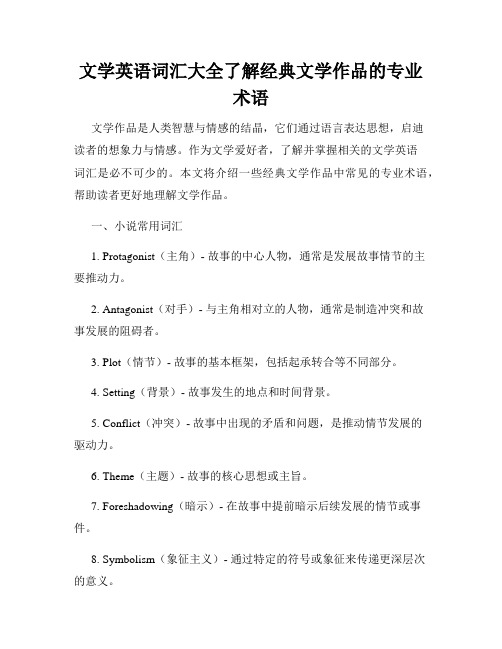
文学英语词汇大全了解经典文学作品的专业术语文学作品是人类智慧与情感的结晶,它们通过语言表达思想,启迪读者的想象力与情感。
作为文学爱好者,了解并掌握相关的文学英语词汇是必不可少的。
本文将介绍一些经典文学作品中常见的专业术语,帮助读者更好地理解文学作品。
一、小说常用词汇1. Protagonist(主角)- 故事的中心人物,通常是发展故事情节的主要推动力。
2. Antagonist(对手)- 与主角相对立的人物,通常是制造冲突和故事发展的阻碍者。
3. Plot(情节)- 故事的基本框架,包括起承转合等不同部分。
4. Setting(背景)- 故事发生的地点和时间背景。
5. Conflict(冲突)- 故事中出现的矛盾和问题,是推动情节发展的驱动力。
6. Theme(主题)- 故事的核心思想或主旨。
7. Foreshadowing(暗示)- 在故事中提前暗示后续发展的情节或事件。
8. Symbolism(象征主义)- 通过特定的符号或象征来传递更深层次的意义。
9. Irony(讽刺)- 用逆转的手法展示出与表面相反的结果或意义。
10. Point of view(视角)- 故事叙述的角度,可以是第一人称、第三人称等。
二、诗歌专业术语1. Rhyme(押韵)- 诗歌中相邻句子或词语的音韵相同或相似。
2. Meter(韵律)- 诗歌中由重音和轻音组成的节奏。
3. Stanza(诗节)- 诗歌中的一组排列整齐的行。
4. Simile(明喻)- 通过使用"like"或"as"来进行比喻的修辞手法。
5. Metaphor(隐喻)- 直接将一个事物比作另一个事物的修辞手法。
6. Personification(拟人)- 赋予非人事物以人类特征的修辞手法。
7. Alliteration(头韵)- 诗句中多个字母或音节以相同的辅音开头。
8. Assonance(押韵)- 诗句中多个字母或音节以相同的元音结尾。
文学专业英语词汇
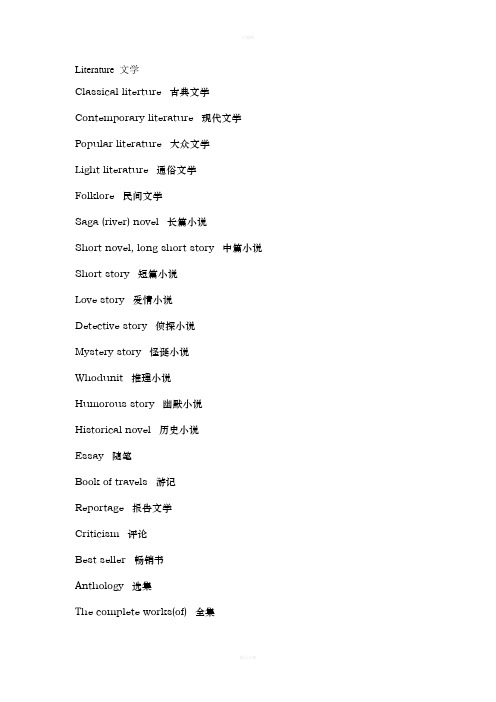
Literature 文学Classical literture 古典文学Contemporary literature 现代文学Popular literature 大众文学Light literature 通俗文学Folklore 民间文学Saga (river) novel 长篇小说Short novel, long short story 中篇小说Short story 短篇小说Love story 爱情小说Detective story 侦探小说Mystery story 怪诞小说Whodunit 推理小说Humorous story 幽默小说Historical novel 历史小说Essay 随笔Book of travels 游记Reportage 报告文学Criticism 评论Best seller 畅销书Anthology 选集The complete works(of) 全集Edition, printing 版Masterpiece 杰作Copyright 版权, 著作权Deluxe binding 精装Flat stitching 平装Smyth sewed 线装Humanities 人文学科Writer 作家Book 书Volume 卷Theatre 戏剧(美作theater)Drama 话剧Comedy 喜剧Tragedy 悲剧Farce 滑稽剧Play 剧本The three unities 三一律(一个情节,一个地点,一个时间) Playwright 编剧Act 幕Scene 场Plot 情节Intrigue 错综复杂的剧情Story 故事Episode 逸事Ending, denouement 结局Poetry 诗歌Poet 诗人Poem 诗Epic poetry 史诗Epopee 叙事诗Ode 颂歌Sonnet 十四行诗Verse, stanza (诗)节Line (诗)行Rhyme 韵脚,押韵Metrics 韵律学,格律学Prose 散文Novel 小说Biography 自传Allegory 寓言Science fiction 科幻,科学幻想小说Satire 讽刺诗Essay 杂文Composition 学术著作Rhetoric 修辞学Oratory 讲演术Declamation 朗诵技巧Improvisation 即席讲演Criticism 批判主义Critic 批评家Wit 才智,创作才能Eloquence 文才Lyricism 抒情性。
文学英语词汇大全学会描述文学作品及文学流派深化文学交流
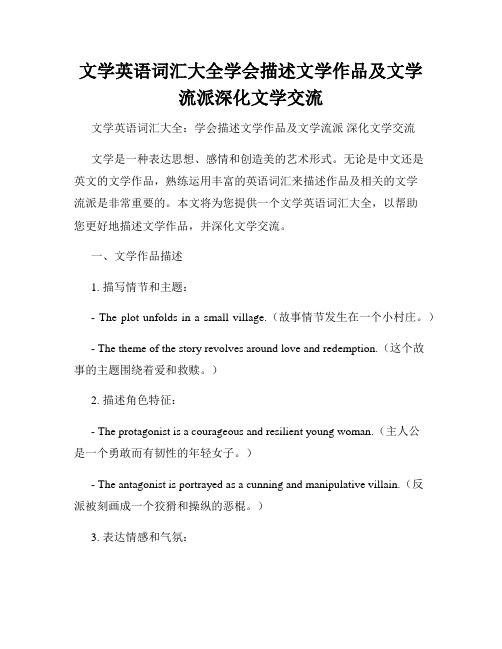
文学英语词汇大全学会描述文学作品及文学流派深化文学交流文学英语词汇大全:学会描述文学作品及文学流派深化文学交流文学是一种表达思想、感情和创造美的艺术形式。
无论是中文还是英文的文学作品,熟练运用丰富的英语词汇来描述作品及相关的文学流派是非常重要的。
本文将为您提供一个文学英语词汇大全,以帮助您更好地描述文学作品,并深化文学交流。
一、文学作品描述1. 描写情节和主题:- The plot unfolds in a small village.(故事情节发生在一个小村庄。
)- The theme of the story revolves around love and redemption.(这个故事的主题围绕着爱和救赎。
)2. 描述角色特征:- The protagonist is a courageous and resilient young woman.(主人公是一个勇敢而有韧性的年轻女子。
)- The antagonist is portrayed as a cunning and manipulative villain.(反派被刻画成一个狡猾和操纵的恶棍。
)3. 表达情感和气氛:- The author skillfully creates a melancholic atmosphere throughout the novel.(作者巧妙地在整个小说中创造了一种忧郁的氛围。
)- The story is infused with a sense of hope and optimism.(这个故事充满了希望和乐观的情感。
)4. 形容文学作品风格:- The writing style is lyrical and poetic, evoking vivid imagery.(写作风格抒情而富有诗意,引起了生动的意象。
)- The prose is concise and precise, highlighting the author's attention to detail.(散文简练而精确,突出了作者对细节的注意。
英语初级1000词汇表
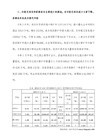
king 国王
minister 大臣
dentist 牙医
guide 导游
merchant 商人
artist 艺术家
composer 作曲家
baby sitter 保姆
librarian 图书管理员
firefighter 消防员
postman 邮递员
soldier 战士
Japan 日本
Korea 韩国
India 印度
Germany 德国
France 法国
clothes 衣服
coat 外套
dress 女装
shirt 衬衫
blouse 女式衬衫
skirt 裙子
trousers 裤子
suit 套装
uniform 制服
jacket 夹克衫
sweater 毛衣
canvas 画布
carving 雕刻
figure 塑像
author 作者
copyright 版权
comedy 喜剧
tragedy 悲剧
performance 演出
story 故事
poem 诗歌
novel 小说
love 爱
like 喜欢
very 非常的
great 伟大的
bank 银行
library 图书馆
airport 机场
cinema 电影院
station 车站
club 俱乐部
park 公园
zoo 动物园
China 中国
America 美国
England 英国
考研英语大纲5500词汇表
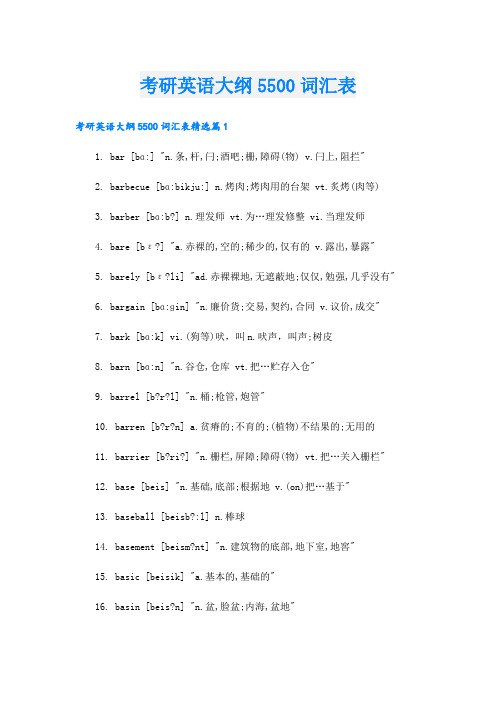
考研英语大纲5500词汇表考研英语大纲5500词汇表精选篇11. bar [bɑ:] "n.条,杆,闩;酒吧;栅,障碍(物) v.闩上,阻拦"2. barbecue [bɑ:bikju:] n.烤肉;烤肉用的台架 vt.炙烤(肉等)3. barber [bɑ:b?] n.理发师 vt.为…理发修整 vi.当理发师4. bare [bε?] "a.赤裸的,空的;稀少的,仅有的 v.露出,暴露"5. barely [bε?li] "ad.赤裸裸地,无遮蔽地;仅仅,勉强,几乎没有"6. bargain [bɑ:ɡin] "n.廉价货;交易,契约,合同 v.议价,成交"7. bark [bɑ:k] vi.(狗等)吠,叫n.吠声,叫声;树皮8. barn [bɑ:n] "n.谷仓,仓库 vt.把…贮存入仓"9. barrel [b?r?l] "n.桶;枪管,炮管"10. barren [b?r?n] a.贫瘠的;不育的;(植物)不结果的;无用的11. barrier [b?ri?] "n.栅栏,屏障;障碍(物) vt.把…关入栅栏"12. base [beis] "n.基础,底部;根据地 v.(on)把…基于"13. baseball [beisb?:l] n.棒球14. basement [beism?nt] "n.建筑物的底部,地下室,地窖"15. basic [beisik] "a.基本的,基础的"16. basin [beis?n] "n.盆,脸盆;内海,盆地"17. basis [beisis] "n.基础,根据"18. basket "[bɑ:skit, b?s-]" n.筐,篮,篓19. basketball "[bɑ:skitb?:l, b?s-]" n.篮球,篮球运动20. bat [b?t] "n.球拍,球棒,短棒;蝙蝠"21. batch [b?t?] "n.一批,一组,一群"22. bath [bɑ:θ/b?θ] "n.沐浴,洗澡;浴室(池,盆) v.(给…)洗澡"23. bathe [beie] "v.游泳,洗澡,浸,弄湿"24. bathroom [bɑ:θrum] "n.浴室;盥洗室,卫生间"25. battery [b?t?ri] n.电池(组);(器具等的)一组,一套;炮兵连26. battle [b?tl] "n.战役,战斗;斗争 v.战斗,斗争,搏斗"27. bay [bei] "n.海湾,(港)湾"28. be "[强bi:, 弱bi]" v.(就)是,等于;(存)在;到达,来到,发生29. beach [bi:t?] "n.海滩,湖滩,河滩"30. beam [bi:m] "n.(横)梁,桁条;(光线的)束,柱 v.微笑"31. bean [bi:n] "n.豆;菜豆,蚕豆"32. bear [bε?] "n.熊 v.忍受,容忍;负担;结果实,生子女"33. beard [bi?d] n.胡须34. bearing [bε?ri?] n.轴承;忍受;关系,影响;举止;方向35. beast [bi:st] "n.兽,牲畜;凶残的人,举止粗鲁的人"36. beat [bi:t] n.敲打;(心脏等)跳动 v.打败;(心脏等)跳动37. beautiful [bju:tiful] a.美的,美丽的;出色的,完美的38. beauty [bju:ti] n.美,美丽;美人,美丽的事物39. because [bik?z] conj.因为,由于40. become [bik?m] vi.变成,开始变得vt.适合,同…相称41. bed [bed] "n.床,床位;(苗)床,坛;河床,(湖、海的)底"42. bee [bi:] n.蜂,蜜蜂;忙碌的人43. beef [bi:f] n.牛肉44. beer [bi?] n.啤酒45. before [bif?:] "prep.(指时间)在…以前,在..前面,在..之前"46. beforehand [bif?:h?nd] "ad.预先,事先"47. beg [beɡ] vt.请求,乞求 vi.恳请,行乞48. begin [biɡin] "v.(began,begun)开始,着手"49. beginning [biɡini?] n.开始,开端;起源,早期阶段50. behalf [bihɑ:f] n.利益51. behave [biheiv] "v.举止,举动,表现;运转,开动"52. behavior [biheivj?] "n.(behaviour)行为,举止;(机器等)运转情况"53. behind [bihaind] prep.在...的背后,(遗留)在..后面;落后于54. being [bi:?] "n.生物,生命,存在;"55. belief [bili:f] n.信任,相信,信念;信仰,信条56. believe [bili:v] vt.相信,认为 vi.相信,信任,信奉57. bell [bel] "n.钟,铃"58. belly [beli] n.肚子,腹部;(像肚子一样)鼓起的部分,膛59. belong [bil??] "v.(to)属于,附属,隶属;应归入(类别,范畴等)"60. beloved "[bil?vid, -l?vd]" "a./n.受爱戴的,敬爱的;爱人,被心爱的人"61. below [bil?u] prep.在…下面,在…以下 ad.在下面,向下62. belt [belt] "n.(皮)带,腰带;地带"63. bench [bent?] "n.长凳,条凳;(工作)台,座"64. bend [bend] "v.(使)弯曲;屈从,屈服 n.弯曲(处),曲折处"65. beneath [bini:θ] "prep.在…下边,在…之下 ad.在下方"66. beneficial "[,benifi??l]" "a.(to)有利的,有益的"67. benefit [benifit] "n.利益,好处,恩惠 v.有益于;(from,by)受益"68. benign [binain] "a.(病)良性的,(气候)良好的,仁慈的,和蔼的"69. beside [bisaid] prep.在...旁边,在...附近;和...相比70. besides [bisaidz] ad.此外;并且 prep.于…之外;除…以外71. best [best] a.最好的(good和well最高级) ad.最好地;最72. bet [bet] "v.赌,打赌 n.打赌,赌注"73. betray [bitrei] "v.背叛,出卖;暴露,流露,泄露"74. better [bet?] a.较好的 ad.更好(地) v.改良 n.较佳者75. between [bitwi:n] prep.在…之间,在(两者)之间 ad.在中间76. beverage [bev?rid?] n.(水,酒等之外的)饮料77. beware [biwε?] "v.当心,谨防"78. bewilder [biwild?] "v.使迷惑,难住"79. beyond [bij?nd] prep.在(或向)...的那边,远于;超出;80. bias [bai?s] "n./v.(使有)偏见,偏心,偏袒"81. Bible n.圣经82. bibliography "[,bibli?ɡr?fi]" n.(有关某一专题的)书目;参考书目83. bicycle [baisikl] n.(bike)自行车 vi.骑自行车84. bid [bid] "v.祝愿;命令,吩咐;报价,投标 n.出众,投标"85. big [biɡ] a.大的;重要的;宽宏大量的;大受欢迎的86. bill [bil] "n.账单;招贴,广告;(人员,职称等的)表;钞票"87. billion [bilj?n] "num./n.(美)十亿,(英)万亿"88. bin [bin] n.(贮藏食物等用的)箱子89. bind [baind] "v.捆,绑,包括,束缚"90. biography [bai?ɡr?fi] n.传记;传记文学91. biology [bai?l?d?i] n.生物学92. bird [b?:d] n.鸟,雀;女人;嘘声93. birth [bɑ:θ] n.出生,诞生;出身,血统;起源;出现94. birthday [b?:θdei] n.生日;(成方)纪念日95. biscuit [biskit] "n.饼干,点心"96. bit [bit] "n.一点,一些;小块,少量;片刻; [计]位,比特"97. bite [bait] "v./n.咬,叮 n.一口"98. bitter [bit?] "a.(有)苦(味)的;痛苦的,厉害的"99. bizarre [bizɑ:] adj.异乎寻常的,稀奇古怪的100. black [bl?k] a.黑(色)的;黑暗的 n.黑(色);黑暗;黑人考研英语大纲5500词汇表精选篇21. angel [eind??l] n.天使,安琪儿2. anger [??ɡ?] n.愤怒,气愤 vt.使发怒,激怒 vi.发怒3. angle [??ɡl] n.角,角度 v.钓鱼;(采用各种方法)取得4. angry [??ɡri] a.生气的,愤怒的;(天气)风雨交加的5. anguish [??ɡwi?] n.(尤指心灵上的)极度痛苦,烦恼6. animal [?nim?l] n.动物,野兽,牲畜 a.动物的,野兽的7. ankle [??kl] n.足踝,踝关节8. anniversary "[,?niv?:s?ri]" n.周年,周年纪念日9. announce [?nauns] v.正式宣布;发表;通告;广播(电台节目)10. annoy [?n?i] vt.使恼怒,使生气;打扰 vi.招人讨厌11. annual [?nju?l] a.每年的,一年生的 n.年刊;一年生植物12. anonymous [?n?nim?s] a.匿名的,无名的,姓氏不明的13. another [?n?e?] a.另一个,又,再 pron.另一个,类似的一个14. answer "[ɑ:ns?, ?n-]" vt.回答,答复,答案 v.回答,答复,响应15. ant [?nt] n.蚁;蚂蚁16. antenna [?nten?] n.(无线电或电视的)天线17. anticipate [?ntisipeit] vt.预料;期望;预先考虑;抢先;提前使用18. antique [?nti:k] a.古式的,过时的n.有价值的古物,古董19. anxiety [??zai?ti] n.挂念,焦虑,焦急,忧虑;渴望,热望20. anxious [?nk??s] a.焦虑的,担心的;急于(得到的),渴望的21. any [eni] "a.(用于否定句、疑问句等)什么,一些;任何的"22. anybody "[eni,b?di]" pron.(否定句)任何人;(肯定句)随便哪个人23. anyhow [enihau] ad.不管怎么说,无论如何;不论用何种方法24. anyone [eniw?n] pron.(用于疑问句,否定式)任何人25. anything [eniθi?] pron.任何东西(事物);无论什么东西(事物)26. anyway [eniwei] ad.不管怎么说,无论如何;不论以何种方式27. anywhere [enihwε?] ad.无论哪里;(用于否定、疑问等)任何地方28. apart [?pɑ:t] ad.分离,离开,隔开 a.分离的,分隔的29. apartment [?pɑ:tm?nt] n.[英]房间,套间;[美]公寓30. apologise [?p?l?d?aiz] "v.(to,for)道歉,认错"31. apology [?p?l?d?i] n.道歉,认错,辩解,辩护32. appal [?p?:l] v.使惊骇,使恐怖33. apparatus "[,?p?reit?s]" n.器械,器具,仪器;机构,组织34. apparent [?p?r?nt] "a.表面上的,貌似真实的;显然的,明明白白的"35. appeal [?pi:l] vi.呼吁,恳求;申诉 n.呼吁;申诉;吸引力36. appear [?pi?] vi.出现;出场;问世;仿佛;出版,发表37. appearance [?pi?r?ns] n.出现,露面;外表;(在会议等)作短暂露面38. appendix [?pendiks] n.附录,附属物;阑尾,盲肠39. appetite [?pitait] n.食欲,胃口;欲望,性欲;爱好,趣味40. applaud [?pl?:d] vt.鼓掌欢迎;赞同 vi.鼓掌欢迎,欢呼41. applause [?pl?:z] n.鼓掌;喝彩;夸奖,赞扬42. apple [?pl] n.苹果,苹果树43. appliance [?plai?ns] n.电器;器械,装置;应用,适用44. applicable "[?plik?bl, ?plik?-]" "a.可应用(实施)的;适当的,合适的"45. application "[,?plikei??n]" n.申请,请求,申请书;应用,实施,实用性46. apply [?plai] vi.(以书面形式)申请;请求 vt.应用;实施47. appoint [?p?int] vt.任命,委派;指定,约定(时间、地点等)48. appointment [?p?intm?nt] "n.约会,约定;任命,委派;委任的职位"49. appraisal [?preiz?l] n.对...作出的评价;评价,鉴定,评估50. appreciate [?pri:?ieit] vt.为...表示感激,感谢;欣赏,赏识,评价51. approach [?pr?ut?] "v.靠近,接近n.接近;途径,入门;方式,方法"52. appropriate [?pr?uprieit] "a.适当的,恰当的,特有的 vt.拨给,挪用,盗用"53. approval [?pru:v?l] n.批准,通过;赞成,同意54. approve [?pru:v] v.(of)赞成,赞许,同意;批准,审议,通过55. approximate a.近似的 vi.(to)接近56. April (名)四月57. apt [?pt] a.恰当的,适当的;易于…的,有…倾向的58. arbitrary [ɑ:bitr?ri] a.任意的,任性的,主观的;专断的,武断的59. arch [ɑ:t?] n.拱门,桥拱洞 v.拱起,(使)变成弓形60. architect [ɑ:kitekt] n.建筑师;设计师;缔造者;创造者61. architecture [ɑ:kitekt??] n.建筑,建筑学;建筑式样或风格,建筑物62. area [ε?ri?] n.面积;地区,地域;领域,范围63. argue [ɑɡju:] vi.辩论,争论 vt.辩论,论证;说服,劝说64. argument [ɑ:ɡjum?nt] n.争论(吵),辩论;理由;论证65. arise [?raiz] v.出现,发生;(from)由…引起,由…产生66. arithmetic [?riθm?tik] n.算术,四则运算67. arm [ɑ:m] n.手臂,扶手,臂状物 v.武装;配备 n.武器68. army [ɑ:mi] n.军队,陆军,军;大群,大批69. around [?raund] ad.在...周围,到处 prep.在..四周(或附近)70. arouse [?r?uz] vt.唤醒,叫醒;唤起,激起71. arrange [?reind?] v.安排,筹划;整理,使有条理,排列,布置72. array [?rei] n.大量;排列;盛装 v.列阵;装扮;排列73. arrest [?rest] n.逮捕,扣留 vt.逮捕,扣留;阻止;吸引74. arrival [?raiv?l] n.到达,到来;到达者,到达物75. arrive [?raiv] vi.到达;(时间、事件)到来,发生;达到76. arrogant [?r?ɡ?nt] a.傲慢的,自大的77. arrow [?r?u] n.箭,矢,箭状物;箭头符号78. art [ɑ:t] n.艺术,美术;技术,技艺;文科,人文科学79. artery [ɑ:t?ri] n.动脉;干线,要道80. article [ɑ:tik?l] n.*,论文;条款,条文;物件;冠词81. articulate [ɑ:tikjul?t] a.善于表达的;有关节相连的 v.清楚地讲话82. artificial "[,ɑ:tifi??l]" a.人工的,人造的,人为的;虚伪的,做作的83. artist [ɑ:tist] n.艺术家,美术家;(某方面的)能手84. artistic [ɑ:tistik] a.艺术(家)的,美术(家)的;善于艺术创作的85. as ad.同样地 conj.由于;像...一样 prep.作为86. ascend [?send] vi.渐渐上升,升高vt.攀登,登上87. ascertain [?send] vt.确定,查明,弄清88. ash [??] n.灰,灰末;(pl.)骨灰;(pl.)废墟89. ashamed [??eimd] a.惭愧的,羞耻的,害臊的90. ashore [:] ad.上岸;在岸上,向岸上91. aside [?said] ad.在旁边,到一边 n.旁白;离题的话92. ask "[ɑ:sk, ?sk]" vt.问,询问;请求,要求;邀请,约请93. asleep [?sli:p] a.睡觉,睡着(用作表语)94. aspect [?spekt] "n.样子, 外表, 面貌, (问题等的)方面"95. aspire [?spai?] vi.(to,after)渴望,追求,有志于96. assassinate [?s?sineit] vt.暗杀,行刺;中伤97. assault [?s?:lt] v.猛烈地攻击,袭击 n.突然而猛烈的攻击98. assemble [?sembl] vt.集合,召集;装配;收集 vi.集合,聚集99. assembly [?sembli] n.集合;会议;装配;(美)洲议会的众议院100. assert [?s?:t] "vt.断言,宣称;坚持;主张(权利、权威等)"考研英语大纲5500词汇表精选篇31. carry [k?ri] "v.运送,搬运;传送,传播;领,带"2. cart [kɑ:t] "n.(二轮货运)马车,手推车"3. cartoon [kɑ:tu:n] "n.漫画,幽默画;动画片"4. carve [kɑ:v] v.(雕)刻5. case [keis] "n.箱,盒,容器;情况,事实;病例;案件"6. cash [k??] "n.现金,现款 v.兑现,付(或收)现款"7. cashier [k??i?] "n.收银员,出纳员"8. cassette [k?set] n.盒子;盒式磁带9. cast "[kɑ:s, k?st]" "v.投,扔,掷,抛;铸造;投票;n.演员表"10. castle "[kɑ:sl, k?-]" n.城堡;(国际象棋中的)车11. casual [k??ju?l] "a.偶然的,碰巧的;临时的,非正式的"12. casualty [k??ju?lti] n.伤亡人员;受害人;损失的东西;急诊室13. cat [k?t] n.猫;猫科动物;14. catalog [k?t?l?ɡ] n.(catalogue)目录(册) v.编目(录)15. catastrophe [k?t?str?fi] n.大灾难;(悲剧)结局16. catch [k?t?] "v.捕捉,捕获;赶上;感染;理解,听到"17. category [k?tiɡ?ri] n.种类,部属,类目;范畴,类型18. cater [keit?] "vi.(for/to)满足,迎合;(for)提供饮食及服务"19. cathedral [k?θi:dr?l] n.大教堂20. Catholic a.天主教的 n.天主教徒21. cattle [k?tl] "n.牛;牲口,家畜"22. cause [k?:z] "n.原因;事业,事件,奋斗目标 v.使产生,引起"23. caution [k?:??n] n.谨慎;注意(事项),警告vt.劝…小心24. cautious [k?:??s] "a.(of)小心的,谨慎的"25. cave [keiv] "n.洞,穴"26. cease [si:s] "v./n.停止,中止"27. ceiling [si:li?] n.天花板;(规定价格、工资等的)最高限额28. celebrate [selibreit] vt.庆祝;颂扬,赞美vi.庆祝,过节29. celebrity [silebr?ti] n.名人,名流;著名,名声,名望30. cell [sel] n.细胞;小房间;蜂房;电池31. cellar [sel?] "n.地窑,地下室"32. cement [siment] "n.水泥;胶泥,胶接剂 v.胶合;巩固,加强"33. cemetery [semit?ri] n.坟墓,墓地,坟场34. census [sens?s] n.人口普查(调查)35. cent [sent] n.分(币);百 per cent百分之36. centigrade [sentiɡreid] n./a.摄氏温度计(的);百分度(的)37. centimetre "[senti,mi:t?]" n.(centimeter)厘米38. central [sentr?l] "a.中心的,中央的,中枢的;主要的"39. centre [sent?] n.中心,中央,中间 vt.集中 vi.以..为中心40. century [sent?uri] "n.世纪,(一)百年"41. cereal [si?ri?l] n.加工而成的谷类食物;谷类植物,谷物42. ceremony [serim?uni] "n.典礼,仪式;礼节,礼仪"43. certain [s?:t?n] "a.某,某一,某些;(of)一定的,确信的,可靠的"44. certainly [s?:t?nli] "ad.一定,必定,无疑;当然,行"45. certainty [s?:t?nti] "n.必然,肯定;必然的事"46. certificate [s?tifikeit] "n.证(明)书,执照"47. certify [s?:tifai] vt.证明,证实;发证书(或执照)给48. chain [t?ein] n.链(条);(pl.)镣铐;一连串 v.用链条拴住49. chair [t?ε?] n.椅子;(会议的)主席 vt.当…的主席,主持50. chairman [t?ε?m?n] "n.主席,议长,会长,董事长"51. chalk [t??:k] "n.粉笔,白垩"52. challenge [t??lind?] "n.挑战(书);艰巨任务,难题 v.向…挑战"53. chamber [t?eimb?] n.房间,室;会议室;议院;(动物体内)腔室54. champagne "[,??mpein]" n.香槟酒;微黄色55. champion [t??mpi?n] "n.冠军,得胜者;拥护者,斗士"56. chance "[t?ɑ:ns, t??ns]" "n.机会;可能性;偶然性,运气v.碰巧,偶然发生"57. chancellor n.(英)大臣;法官;(德、奥)总理;大学校长58. change [t?eind?] "n.改变,变化;零钱 v.更换,调换,交换;改变"59. channel [t??n?l] "n.海峡,水道;信道,波道;路线,途径"60. chaos [kei?s] "n.混乱,紊乱"61. chap [t??p] n./v.(皮肤)变粗糙;发痛;n.小伙子62. chapter [t??pt?] n. 章;回,篇63. character [k?r?kt?] "n.性格,品质,特性;人物,角色;字符,(汉)字"64. characteristic "[,k?r?kt?ristik]" "a.(of)特有的,独特的 n.特征,特性"65. characterize [k?r?kt?raiz] v.(characterise)表示…的特性;描述…特性66. charge [t?ɑ:d?] "v.索(价);控告;充电 n.(pl.)费用,代价;电荷"67. charity [t??r?ti] "n.慈善(团体),仁慈,施舍"68. charm [t?ɑ:m] "n.吸引力,魅力 v.迷人,(使)陶醉;施魔法于"69. chart [t?ɑ:t] n.图表;航海图;航行图 vt.绘图表,制图表70. charter [t?ɑt?] "v.租船,租车,租用飞机;n.宪章,特许状"71. chase [t?eis] "v./n.追逐,追求"72. chat [t??t] "v./n.闲谈,聊天"73. cheap [t?i:p] "a.便宜的;低劣的,不值钱的"74. cheat [t?i:t] "v.欺骗;作弊 n.骗子;欺诈,欺骗行为"76. cheer [t?i?] "v.(使)振奋,(使)高兴 v./n.喝彩,欢呼"77. cheese [t?i:z] "n.干酪,乳酪"78. chef [?ef] n.(餐馆等的)厨师长,厨师79. chemical [kemik?l] "a.化学的 n.(pl.)化学制品,化学药品"80. chemist [kemist] n.化学家;药剂师81. chemistry [kemistri] n.化学82. cheque [t?ek] "n.(check)支票,空白支票;总收入"83. cherish [t?eri?] vt.抱有,怀有(希望等);爱护,抚育;珍爱84. cherry [t?eri] n.樱桃(树)85. chess [t?es] n.棋,国际象棋86. chest [t?est] "n.胸腔,胸膛;箱,柜"87. chew [t?u:] v.咀嚼;思量88. chicken [t?ikin] n.鸡肉;鸡,小鸡,小鸟89. chief [t?i:f] "a.主要的,首要的 n.首领,领袖"90. child [t?aild] n.( [pl.] children)小孩,儿童,儿女91. childhood [t?aildhud] "n.幼年,童年"92. chill [t?il] "n.寒冷,寒气,寒战 v.使寒冷"93. chimney [t?imni] n.烟囱95. china n.瓷器96. chip [t?ip] "n.切屑,碎片;(土豆等的)薄片;集成电路块"97. chocolate [t??k?lit] "n.巧克力(糖),赭色"98. choice [t??is] "n.选择(机会),抉择,选择项;入选者 a.精选的"99. choke [t??uk] "v.窒息,噎住;闷塞,堵塞,阻塞"100. choose [t?u:z] "v.选择,挑选;甘愿"。
英语课程中的文学分析术语与词汇
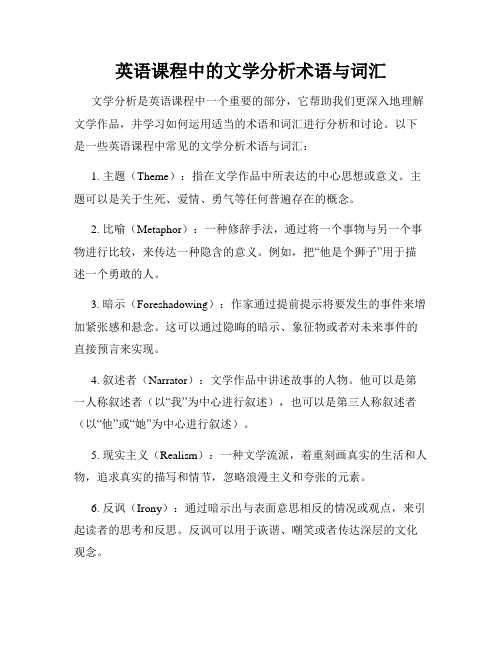
英语课程中的文学分析术语与词汇文学分析是英语课程中一个重要的部分,它帮助我们更深入地理解文学作品,并学习如何运用适当的术语和词汇进行分析和讨论。
以下是一些英语课程中常见的文学分析术语与词汇:1. 主题(Theme):指在文学作品中所表达的中心思想或意义。
主题可以是关于生死、爱情、勇气等任何普遍存在的概念。
2. 比喻(Metaphor):一种修辞手法,通过将一个事物与另一个事物进行比较,来传达一种隐含的意义。
例如,把“他是个狮子”用于描述一个勇敢的人。
3. 暗示(Foreshadowing):作家通过提前提示将要发生的事件来增加紧张感和悬念。
这可以通过隐晦的暗示、象征物或者对未来事件的直接预言来实现。
4. 叙述者(Narrator):文学作品中讲述故事的人物。
他可以是第一人称叙述者(以“我”为中心进行叙述),也可以是第三人称叙述者(以“他”或“她”为中心进行叙述)。
5. 现实主义(Realism):一种文学流派,着重刻画真实的生活和人物,追求真实的描写和情节,忽略浪漫主义和夸张的元素。
6. 反讽(Irony):通过暗示出与表面意思相反的情况或观点,来引起读者的思考和反思。
反讽可以用于诙谐、嘲笑或者传达深层的文化观念。
7. 隐喻(Simile):一种修辞手法,通过将一个事物与另一个事物进行比较,使用“像”或“如同”等词语来表示相似之处。
例如,“勇敢如同一只狮子”。
8. 普遍性(Universality):文学作品具有超越时间和地域限制的普遍价值和共鸣,能够触及读者的情感和思考。
9. 冲突(Conflict):故事中的核心问题或争议。
冲突可以是内部的(例如心理斗争)或外部的(例如社会压力)。
10. 符号(Symbol):一种具有特定含义的事物、人物或者场景,代表着更深层次的意义。
例如,白色通常象征和平和纯洁。
以上只是英语课程中常见的一些文学分析术语与词汇,通过学习和理解这些概念,我们可以更全面地阅读和欣赏文学作品。
升级英语词汇库文学英语词汇大全
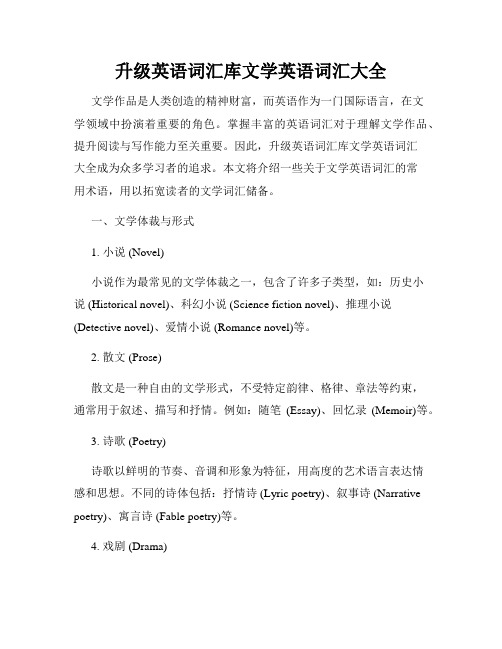
升级英语词汇库文学英语词汇大全文学作品是人类创造的精神财富,而英语作为一门国际语言,在文学领域中扮演着重要的角色。
掌握丰富的英语词汇对于理解文学作品、提升阅读与写作能力至关重要。
因此,升级英语词汇库文学英语词汇大全成为众多学习者的追求。
本文将介绍一些关于文学英语词汇的常用术语,用以拓宽读者的文学词汇储备。
一、文学体裁与形式1. 小说 (Novel)小说作为最常见的文学体裁之一,包含了许多子类型,如:历史小说 (Historical novel)、科幻小说 (Science fiction novel)、推理小说(Detective novel)、爱情小说 (Romance novel)等。
2. 散文 (Prose)散文是一种自由的文学形式,不受特定韵律、格律、章法等约束,通常用于叙述、描写和抒情。
例如:随笔(Essay)、回忆录(Memoir)等。
3. 诗歌 (Poetry)诗歌以鲜明的节奏、音调和形象为特征,用高度的艺术语言表达情感和思想。
不同的诗体包括:抒情诗 (Lyric poetry)、叙事诗 (Narrative poetry)、寓言诗 (Fable poetry)等。
4. 戏剧 (Drama)戏剧是一种以对话和动作来呈现故事情节的文学形式,通常包括舞台剧 (Stage play)、影视剧 (Film/TV drama)等。
常见的戏剧形式有:喜剧 (Comedy)、悲剧 (Tragedy)等。
二、文学技巧与元素1. 比喻 (Metaphor)比喻是一种修辞手法,通过将一个概念与另一个概念进行隐喻性的联系,以达到形象化的效果。
例如:"世界是一本书"。
2. 暗示 (Foreshadowing)暗示是指在文学作品中提前预示某一事件或发展,为后续情节埋下伏笔。
例如:角色的梦境或对白中透露出将来要发生的事情。
3. 反讽 (Irony)反讽是一种修辞手法,通过表达与原本意义相反的东西来达到一种戏剧性的效果。
文学文艺英语
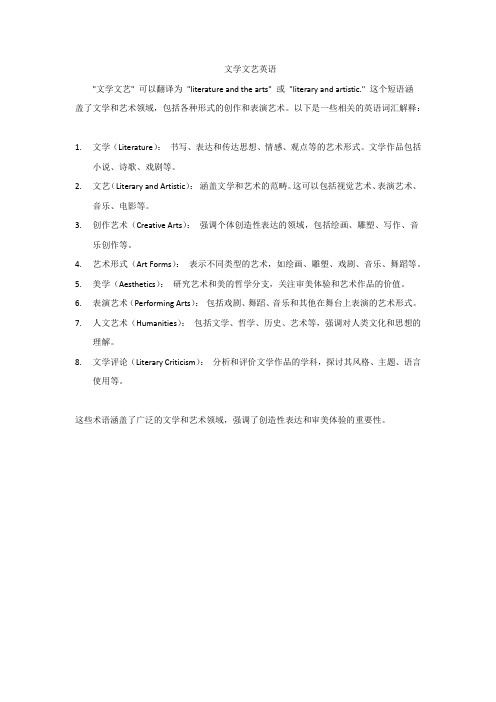
文学文艺英语
"文学文艺" 可以翻译为"literature and the arts" 或"literary and artistic." 这个短语涵
盖了文学和艺术领域,包括各种形式的创作和表演艺术。
以下是一些相关的英语词汇解释:
1.文学(Literature):书写、表达和传达思想、情感、观点等的艺术形式。
文学作品包括
小说、诗歌、戏剧等。
2.文艺(Literary and Artistic):涵盖文学和艺术的范畴。
这可以包括视觉艺术、表演艺术、
音乐、电影等。
3.创作艺术(Creative Arts):强调个体创造性表达的领域,包括绘画、雕塑、写作、音
乐创作等。
4.艺术形式(Art Forms):表示不同类型的艺术,如绘画、雕塑、戏剧、音乐、舞蹈等。
5.美学(Aesthetics):研究艺术和美的哲学分支,关注审美体验和艺术作品的价值。
6.表演艺术(Performing Arts):包括戏剧、舞蹈、音乐和其他在舞台上表演的艺术形式。
7.人文艺术(Humanities):包括文学、哲学、历史、艺术等,强调对人类文化和思想的
理解。
8.文学评论(Literary Criticism):分析和评价文学作品的学科,探讨其风格、主题、语言
使用等。
这些术语涵盖了广泛的文学和艺术领域,强调了创造性表达和审美体验的重要性。
高中阶段的英语艺术和文学词汇英语知识点
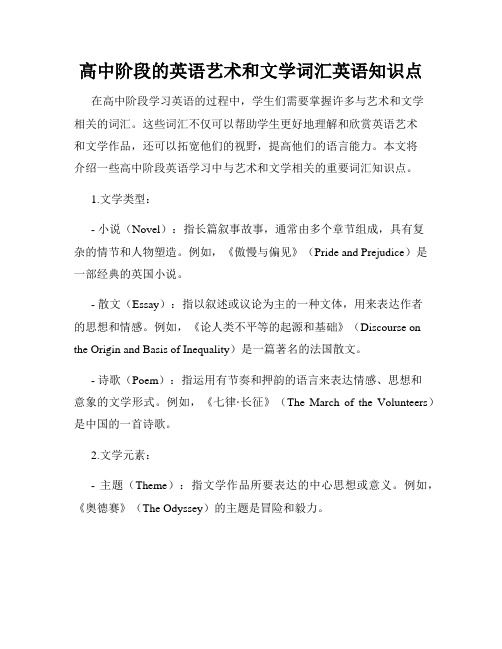
高中阶段的英语艺术和文学词汇英语知识点在高中阶段学习英语的过程中,学生们需要掌握许多与艺术和文学相关的词汇。
这些词汇不仅可以帮助学生更好地理解和欣赏英语艺术和文学作品,还可以拓宽他们的视野,提高他们的语言能力。
本文将介绍一些高中阶段英语学习中与艺术和文学相关的重要词汇知识点。
1.文学类型:- 小说(Novel):指长篇叙事故事,通常由多个章节组成,具有复杂的情节和人物塑造。
例如,《傲慢与偏见》(Pride and Prejudice)是一部经典的英国小说。
- 散文(Essay):指以叙述或议论为主的一种文体,用来表达作者的思想和情感。
例如,《论人类不平等的起源和基础》(Discourse on the Origin and Basis of Inequality)是一篇著名的法国散文。
- 诗歌(Poem):指运用有节奏和押韵的语言来表达情感、思想和意象的文学形式。
例如,《七律·长征》(The March of the Volunteers)是中国的一首诗歌。
2.文学元素:- 主题(Theme):指文学作品所要表达的中心思想或意义。
例如,《奥德赛》(The Odyssey)的主题是冒险和毅力。
- 情节(Plot):指故事的安排和发展过程,包括起因、发展、转折和结局。
例如,《罗密欧与朱丽叶》(Romeo and Juliet)的情节是两个家族之间的禁忌之爱。
- 人物(Character):指出现在文学作品中的虚构人物。
例如,《哈利·波特》系列作品中的哈利·波特(Harry Potter)是一个著名的文学人物。
- 描写(Description):指用文字生动地描绘事物的外貌、特点和细节。
例如,《红与黑》(The Red and the Black)中对于主人公外貌的描写是精彩的。
- 对话(Dialogue):指人物之间的交流和对话。
例如,《傲慢与偏见》中的伊丽莎白·班纳特(Elizabeth Bennet)和达西先生(Mr. Darcy)之间的对话是故事发展的重要一环。
英语词汇本
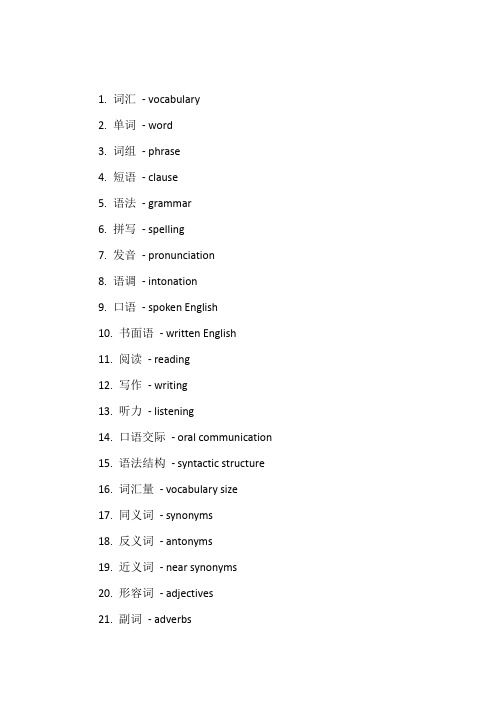
1. 词汇- vocabulary2. 单词- word3. 词组- phrase4. 短语- clause5. 语法- grammar6. 拼写- spelling7. 发音- pronunciation8. 语调- intonation9. 口语- spoken English10. 书面语- written English11. 阅读- reading12. 写作- writing13. 听力- listening14. 口语交际- oral communication15. 语法结构- syntactic structure16. 词汇量- vocabulary size17. 同义词- synonyms18. 反义词- antonyms19. 近义词- near synonyms20. 形容词- adjectives21. 副词- adverbs22. 动词- verbs23. 名词- nouns24. 冠词- articles25. 介词- prepositions26. 连词- conjunctions27. 代词- pronouns28. 感叹词- interjections29. 问句- questions30. 否定句- negations31. 条件句- conditional sentences32. 比较句- comparative sentences33. 最高级句- superlative sentences34. 被动语态- passive voice35. 主动语态- active voice36. 进行时- progressive aspect37. 完成时- perfect aspect38. 完成进行时- perfect progressive aspect39. 时态- tense40. 语态- voice41. 语气- mood42. 句型- sentence pattern43. 主语- subject44. 谓语- predicate45. 宾语- object46. 定语- attributive47. 状语- adverbial48. 补语- complement49. 直接引语- direct speech50. 间接引语- indirect speech这是一个英语学习者非常实用的词汇表。
文学专业英语词汇
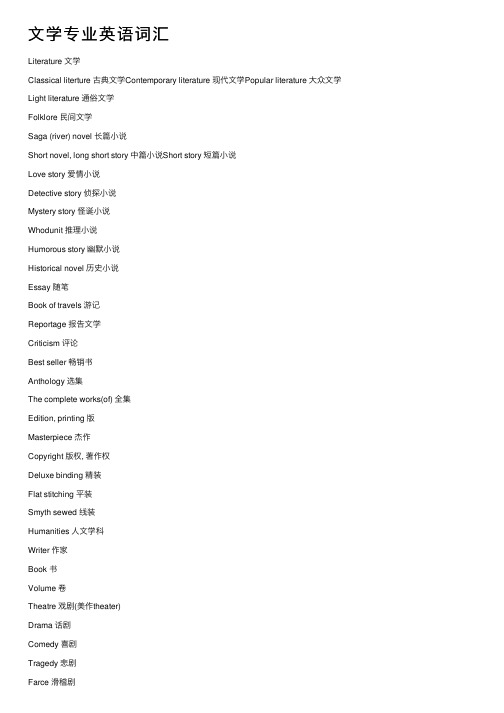
⽂学专业英语词汇Literature ⽂学Classical literture 古典⽂学Contemporary literature 现代⽂学Popular literature ⼤众⽂学Light literature 通俗⽂学Folklore 民间⽂学Saga (river) novel 长篇⼩说Short novel, long short story 中篇⼩说Short story 短篇⼩说Love story 爱情⼩说Detective story 侦探⼩说Mystery story 怪诞⼩说Whodunit 推理⼩说Humorous story 幽默⼩说Historical novel 历史⼩说Essay 随笔Book of travels 游记Reportage 报告⽂学Criticism 评论Best seller 畅销书Anthology 选集The complete works(of) 全集Edition, printing 版Masterpiece 杰作Copyright 版权, 著作权Deluxe binding 精装Flat stitching 平装Smyth sewed 线装Humanities ⼈⽂学科Writer 作家Book 书Volume 卷Theatre 戏剧(美作theater)Drama 话剧Comedy 喜剧Tragedy 悲剧Farce 滑稽剧Play 剧本The three unities 三⼀律(⼀个情节,⼀个地点,⼀个时间) Playwright 编剧Act 幕Scene 场Plot 情节Intrigue 错综复杂的剧情Story 故事Episode 逸事Ending, denouement 结局Poetry 诗歌Poet 诗⼈Poem 诗Epic poetry 史诗Epopee 叙事诗Ode 颂歌Sonnet ⼗四⾏诗Verse, stanza (诗)节Line (诗)⾏Rhyme 韵脚,押韵Metrics 韵律学,格律学Prose 散⽂Novel ⼩说Biography ⾃传Allegory 寓⾔Science fiction 科幻,科学幻想⼩说Satire 讽刺诗Essay 杂⽂Composition 学术著作Rhetoric 修辞学Oratory 讲演术Declamation 朗诵技巧Improvisation 即席讲演Criticism 批判主义Critic 批评家Wit 才智,创作才能Eloquence ⽂才Lyricism 抒情性。
- 1、下载文档前请自行甄别文档内容的完整性,平台不提供额外的编辑、内容补充、找答案等附加服务。
- 2、"仅部分预览"的文档,不可在线预览部分如存在完整性等问题,可反馈申请退款(可完整预览的文档不适用该条件!)。
- 3、如文档侵犯您的权益,请联系客服反馈,我们会尽快为您处理(人工客服工作时间:9:00-18:30)。
英语基本文学词汇表
Allegory寓言
Alliteration 头韵
Allusion典故
Analogy类比
Antagonist 反面人物
Antithesis对偶
Aphorism格言
Apostrophe呼语法
Aside旁白
Assonance谐音
Atmosphere基调,总体艺术效果
Autobiography自传
Ballad叙事诗歌、民谣
Ballad Stanza民谣体诗节
Biography传记
Blank verse无韵诗
An Introduction to Old Medieval English Literature
中古时期英语文学介绍
bold大胆的 mournful悲哀的
elegiac挽歌的 survive幸存的
secular长期的 biblical圣经的
Genesis起源 Exodus(古代以色列人)出埃及
Old Testament基督教的《旧约全书》testament遗
Rood十字架;耶酥受难像 New Testament基督教的《新约全书》
portray描绘 warrior战士,武士
stride跨过 In addition to除…之外
epic史诗 doctrine说教
evoke唤起,引起 harshness严肃
circumstance环境,境况 lot命运
harsh荒芜的 sorrowful悲伤的
fatalistic宿命论的 courageous有勇气的
determined有决心的 typical典型的
setting bards吟游诗人 minstrel吟游诗人(或歌手)
script原本,手迹 funeral葬礼
impend即将发生;进行威 exploit开拓
Scandinavia斯堪的那维亚(半岛)(瑞典、挪威、丹麦、冰岛的泛称
revengeful报复的,深藏仇恨的 sequence次序
glorious光荣的 Thematically从主题上说
primitive远古的;原始的 wage发动
Hostile force敌对邪恶势力 mighty强大的,有力的
mingling混合 mingle embody具体表达
ruddy红的 Rome-backed barren单调的,不孕的flourish繁荣 utter发表;反射
style, tone, genre风格、语气、流派
presentation表达 accurate精确的
originality创新 absent缺少
salvation拯救
narrative verse叙述诗 prose散文
Romance骑士(传奇)文学 characteristic典型的
motif主题;动机;主旨 quest寻求
encounter遭遇 beloved所爱的人
accomplish完成;实现 infidelity失真
maiden少女;处女
liberal自由主义的;不拘泥的 improbable不可能的supernatural不可思仪的事,超自然的 mysteries神秘的事物fantasies幻想 plot情节;结构Characterization人物创造;描述 standardize使标准化wicked邪恶的 episodic插话式的straightforward坦率地;简单的,直接的 aristocratic贵族化的chivalric有骑士风度的
a gallery of一系列(gallery,走廊)
masterpiece名著,杰作 aristocracy贵族,贵族政府
be conscious of知道 ideals理想;观念的;唯心论的practical matter实际事物 detached分离
art巧妙 peculiarly特有的
asceticism禁欲主义 quick wit敏捷,聪明的才智expose揭露 satirize讽刺
abuse陋习;滥用;虐待;辱骂 essentially本质
humanism人文主义 anticipated预示的
observant奉行者,遵守法律或规章、习俗的人
ever-present经常存在的 clash冲突
temperament气质;性情 comic喜剧的;滑稽的
ironic讽刺的 obtainable可得到的distinctions区别;特性 bourgeoisie资产阶级
depict描写 asserting声称;断言
artistic艺术的 alliterative verse头韵的octosyllabic八音节的诗句 couplet对句(双行诗) rhymed couplet iambic抑扬格诗 pentameter五步格诗
heroic couplet英雄体双行诗 ease安逸
prosody诗体论;作诗法;韵律学 virtually事实上
strife斗争,冲突 sect宗派,教派,流派opposing adj.相反的,对立的 India印度
Roman Catholicism天主教 Anglican Church英国国教
Dissenter非国教派的人 divergence分歧
West Indies西印度群岛 adequate adj.足够的standardized标准的,定型的 privileged adj.有特权的plundered n.抢劫,战利品 self-restraint自制
self-reliance自我实现 furtherance n.促进philosophical adj.哲学的 celebrate v.赞美rationality n.唯理性 Yardstick n.准绳Measurement n.度量 superstition迷信injustice不公平 oppression 压力
yield place to让步,屈服 dualistic二元的
mass聚集 democratic adj.民主的didactic adj.说教的 moralize v.说教
revival复苏 proportion比例
unity统一 grace优雅,优美
delight使喜悦 correct告诫
primarily根本上,首先 urbane adj.文雅的
witty adj.诙谐的 genre n.流派
prose n.散文 direct adj.直接的
smooth adj.流畅的 flexible adj.灵活的
lyrical adj.抒情的 epical adj.叙事的
satiric adj.讽刺的 Observed v.说,评述
Heroic Couplets英雄体双行诗
Represent v.扮演,表现 sentimentalists n.感伤主义in due time及时的 wholesome adj.健康的
clarity n.清楚,透明 conciseness n.简明Permanent heritage永久遗产 school n.学派
epigram n.讽刺短诗 arnestness adj.热心的
欢迎您的下载,
资料仅供参考!
致力为企业和个人提供合同协议,策划案计划书,学习资料等等
打造全网一站式需求。
